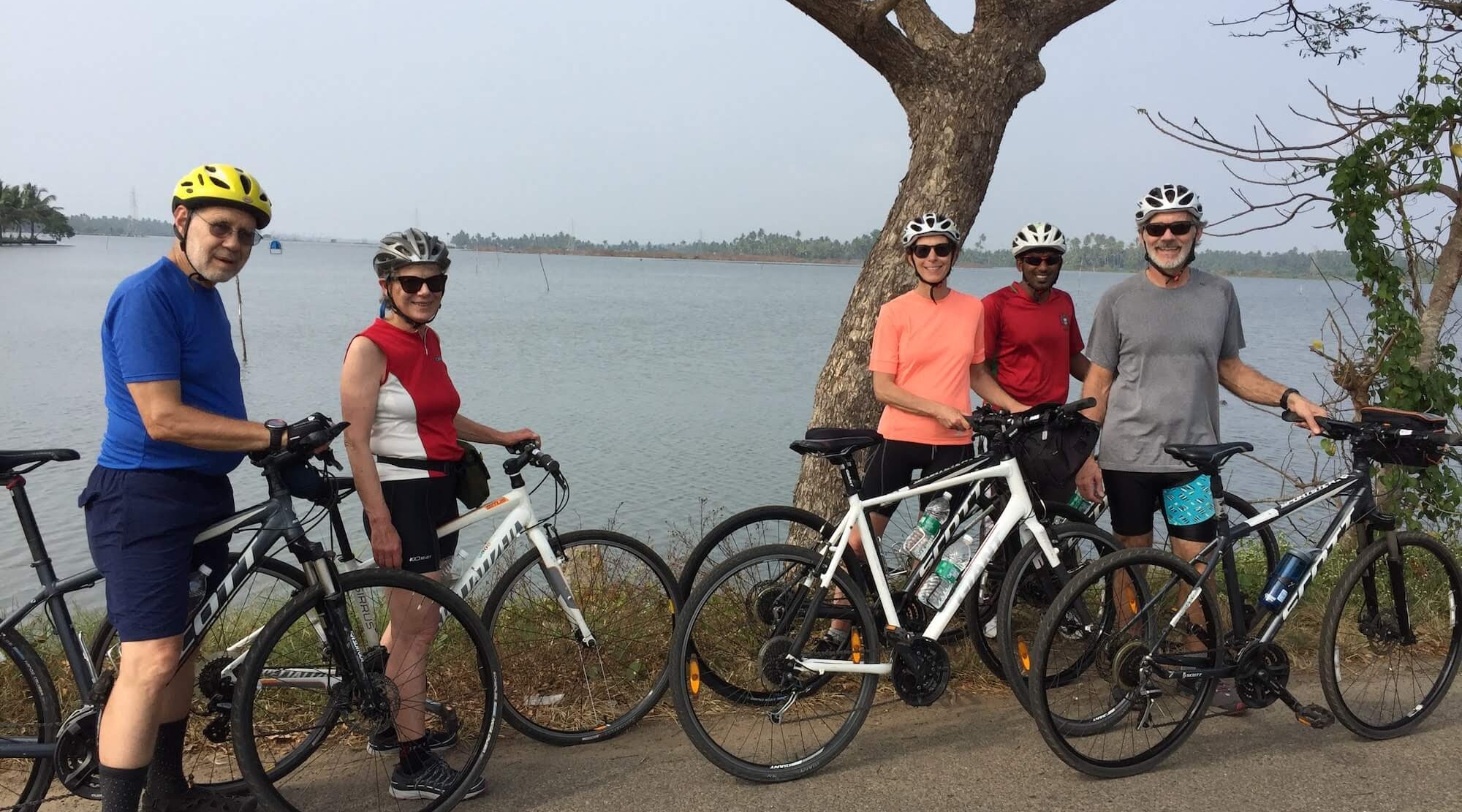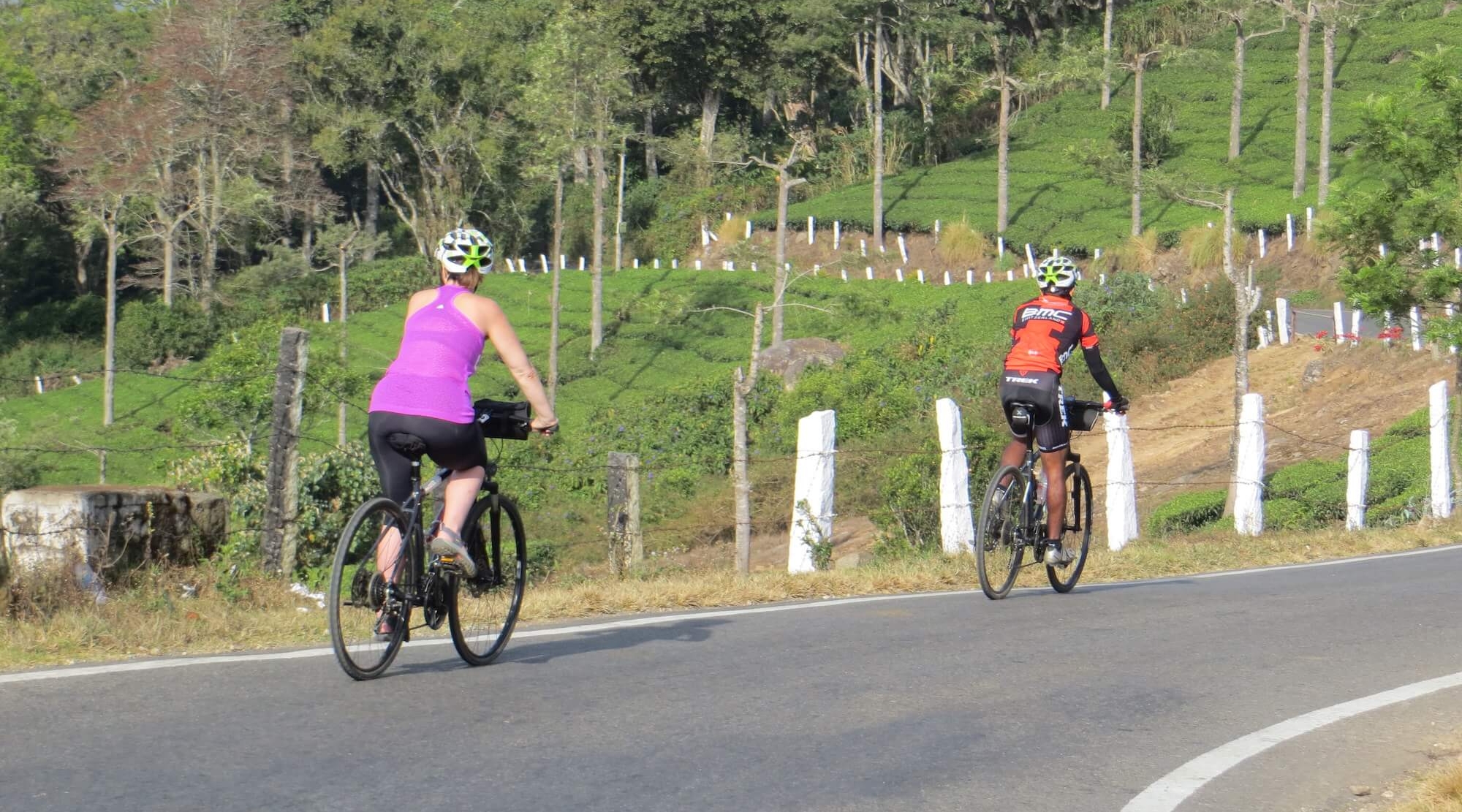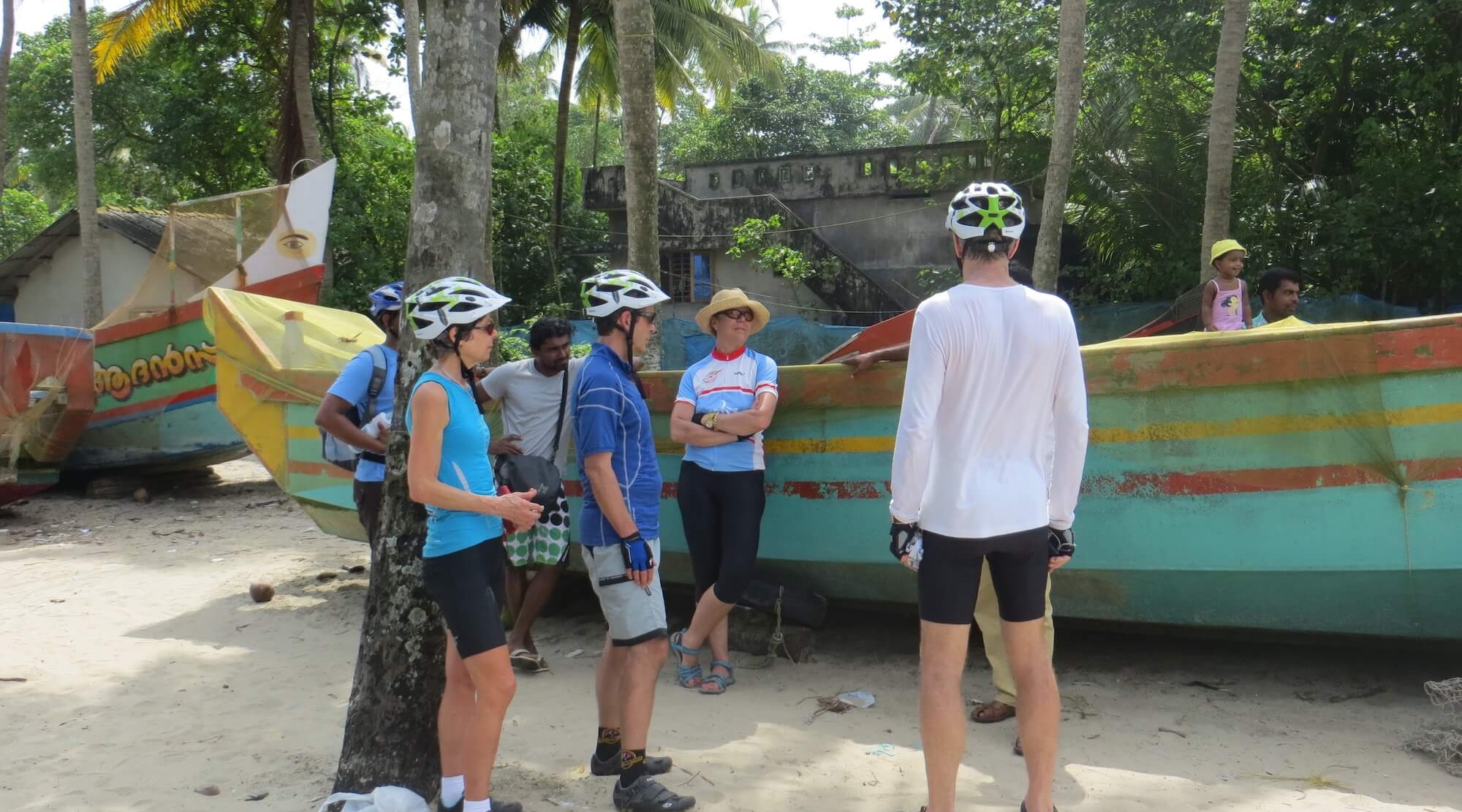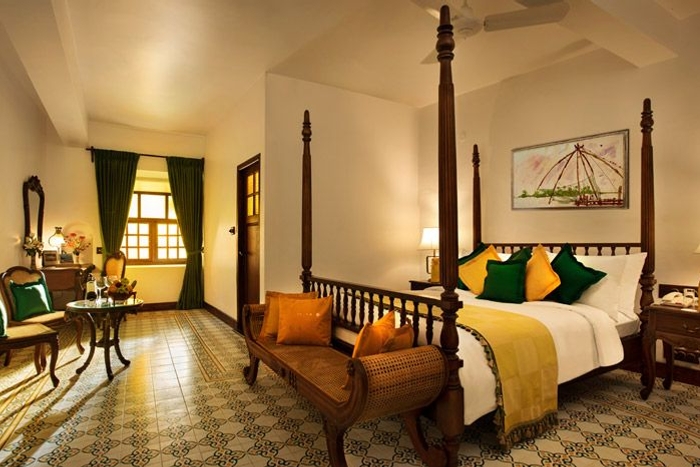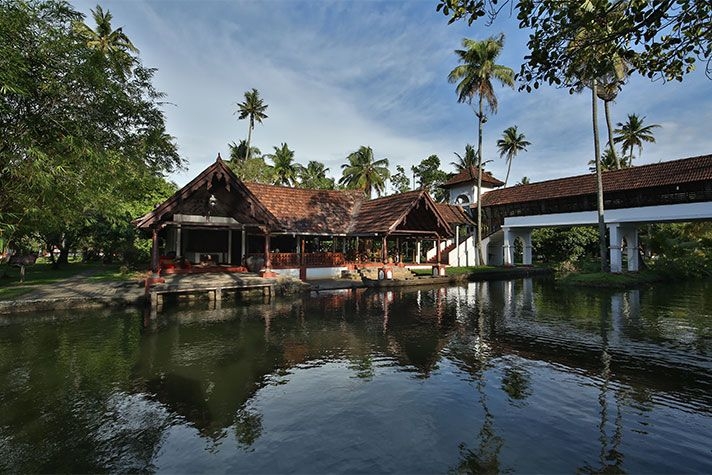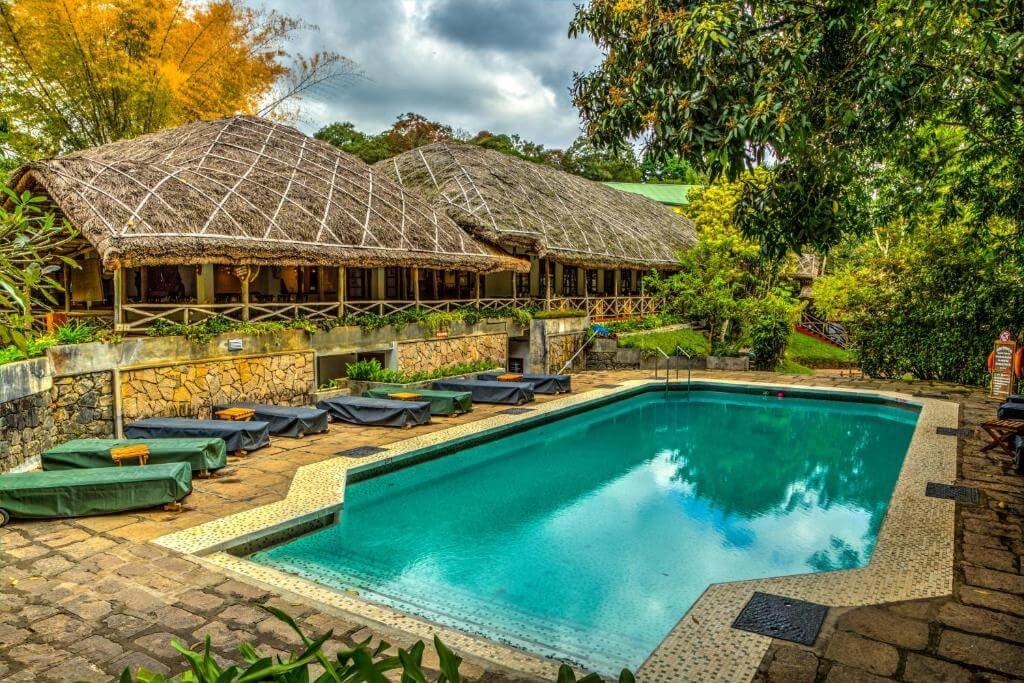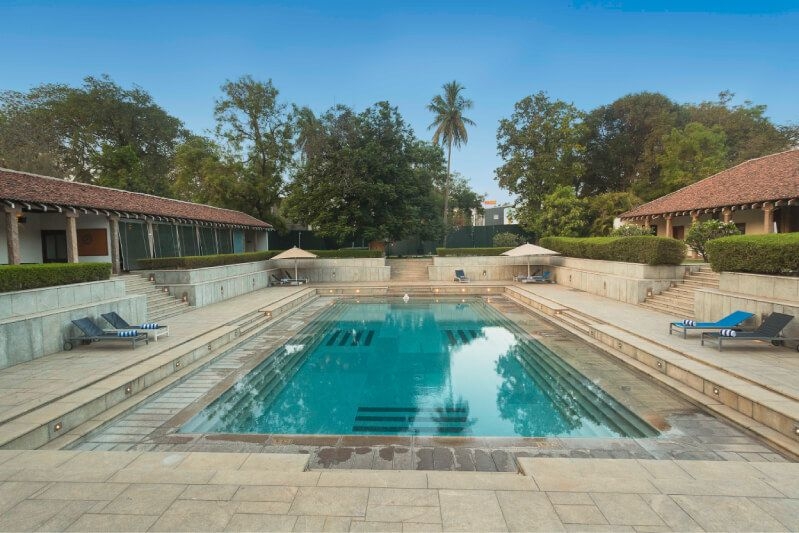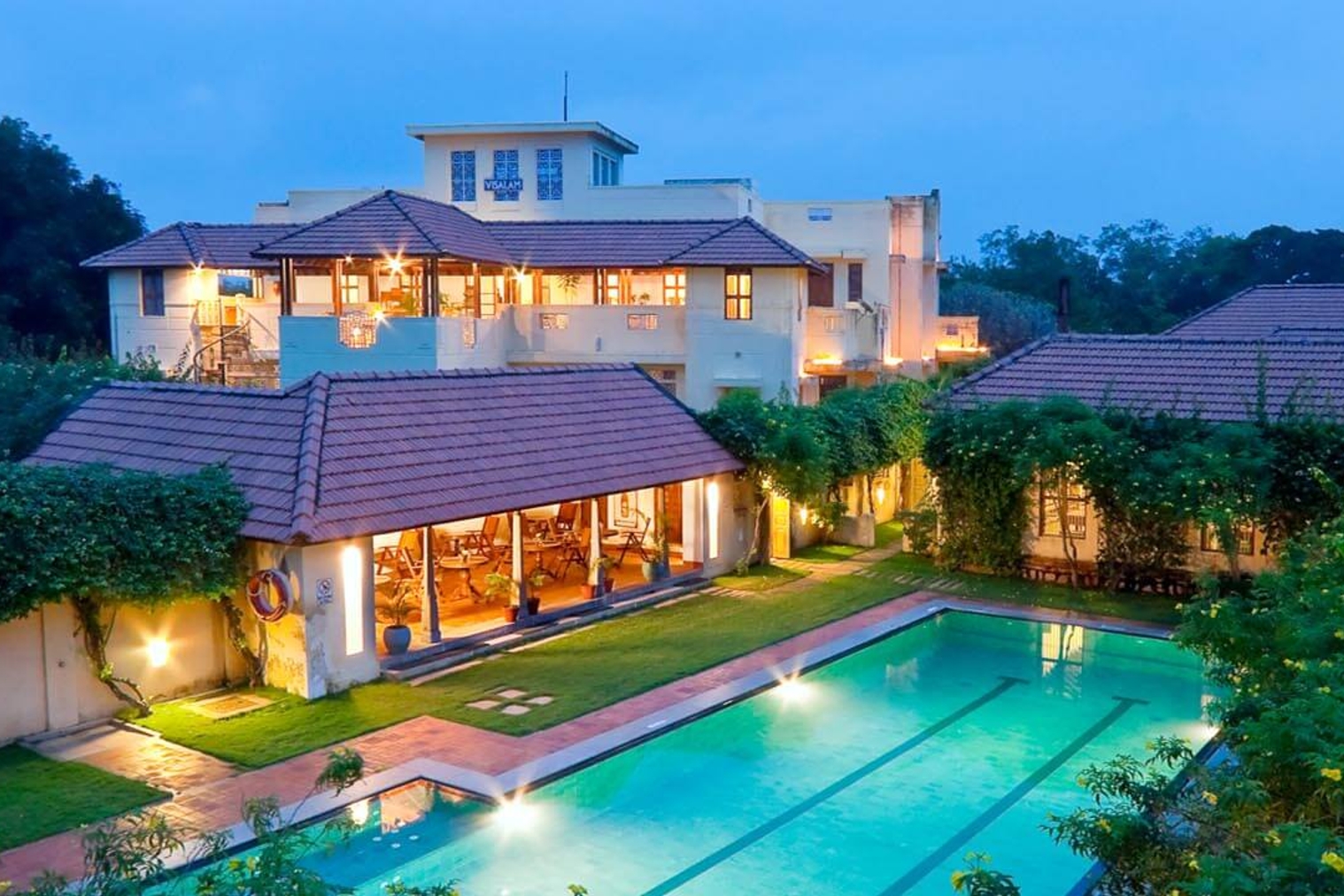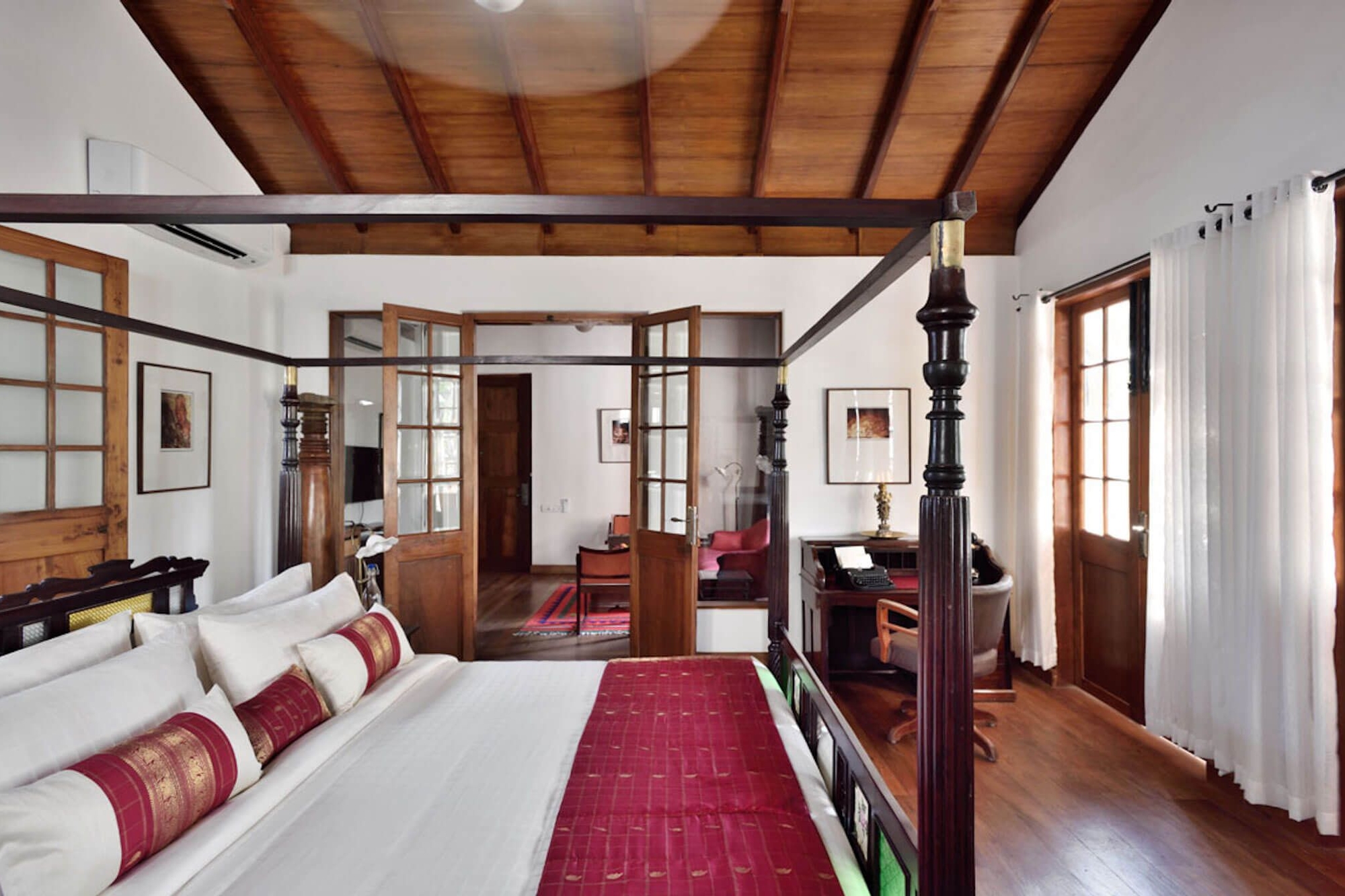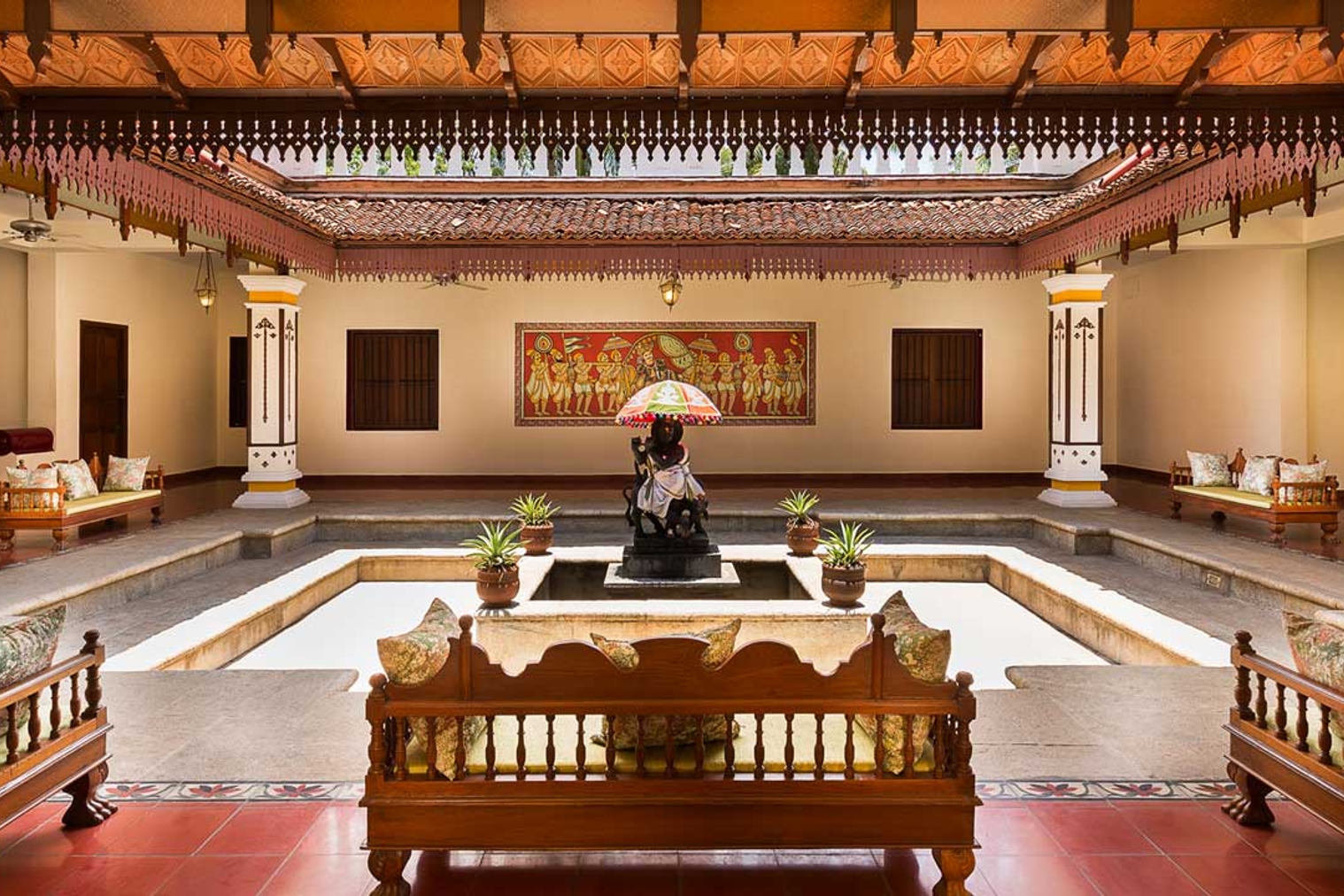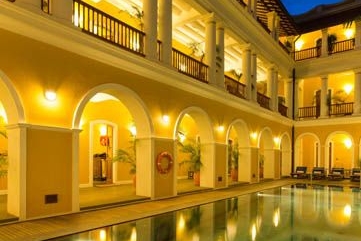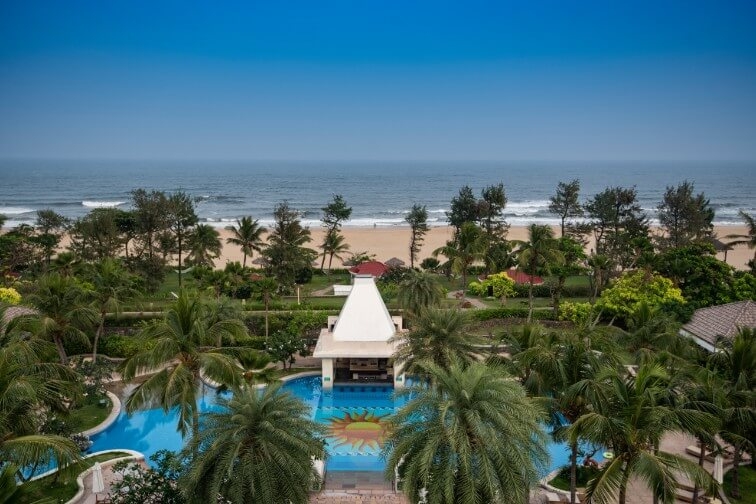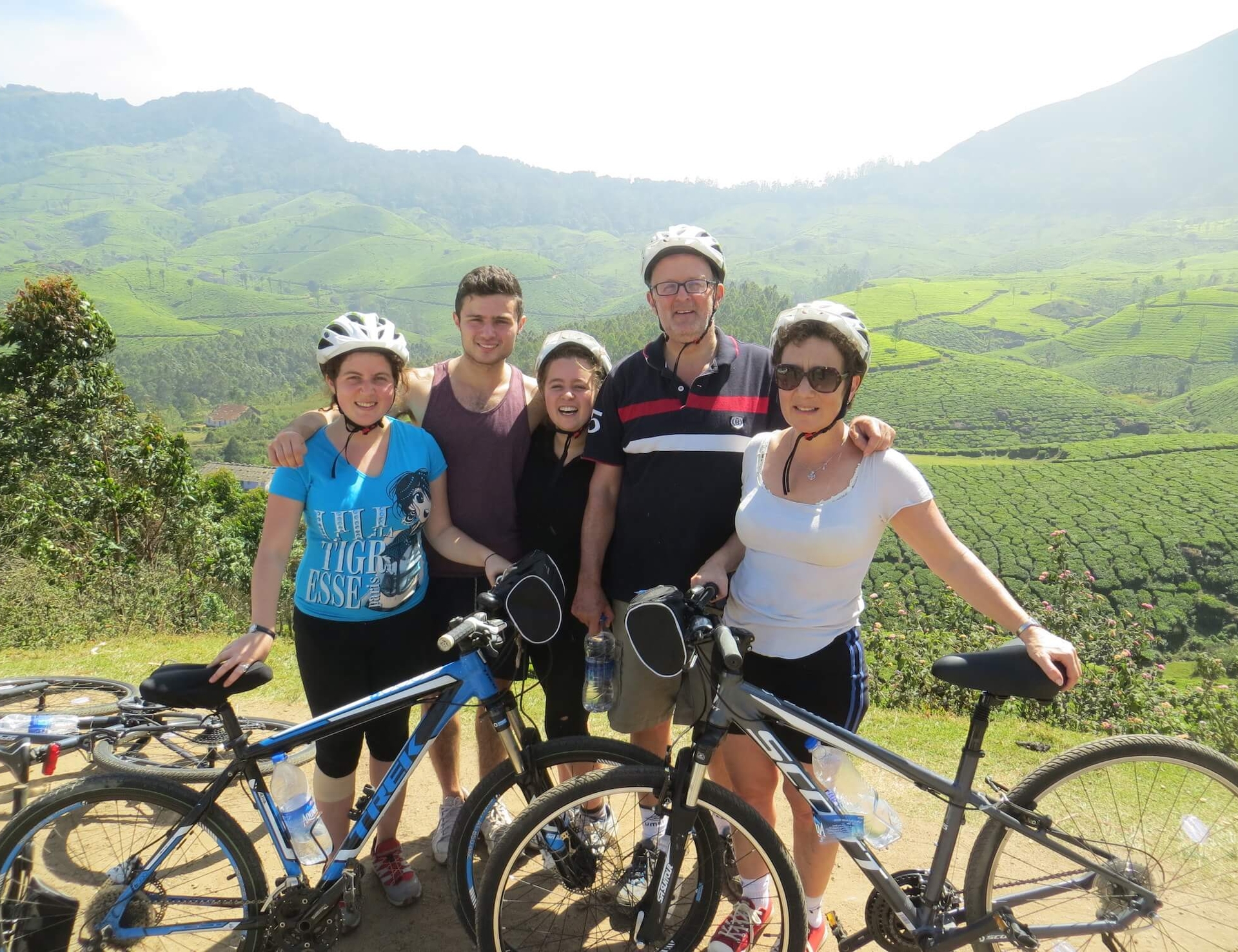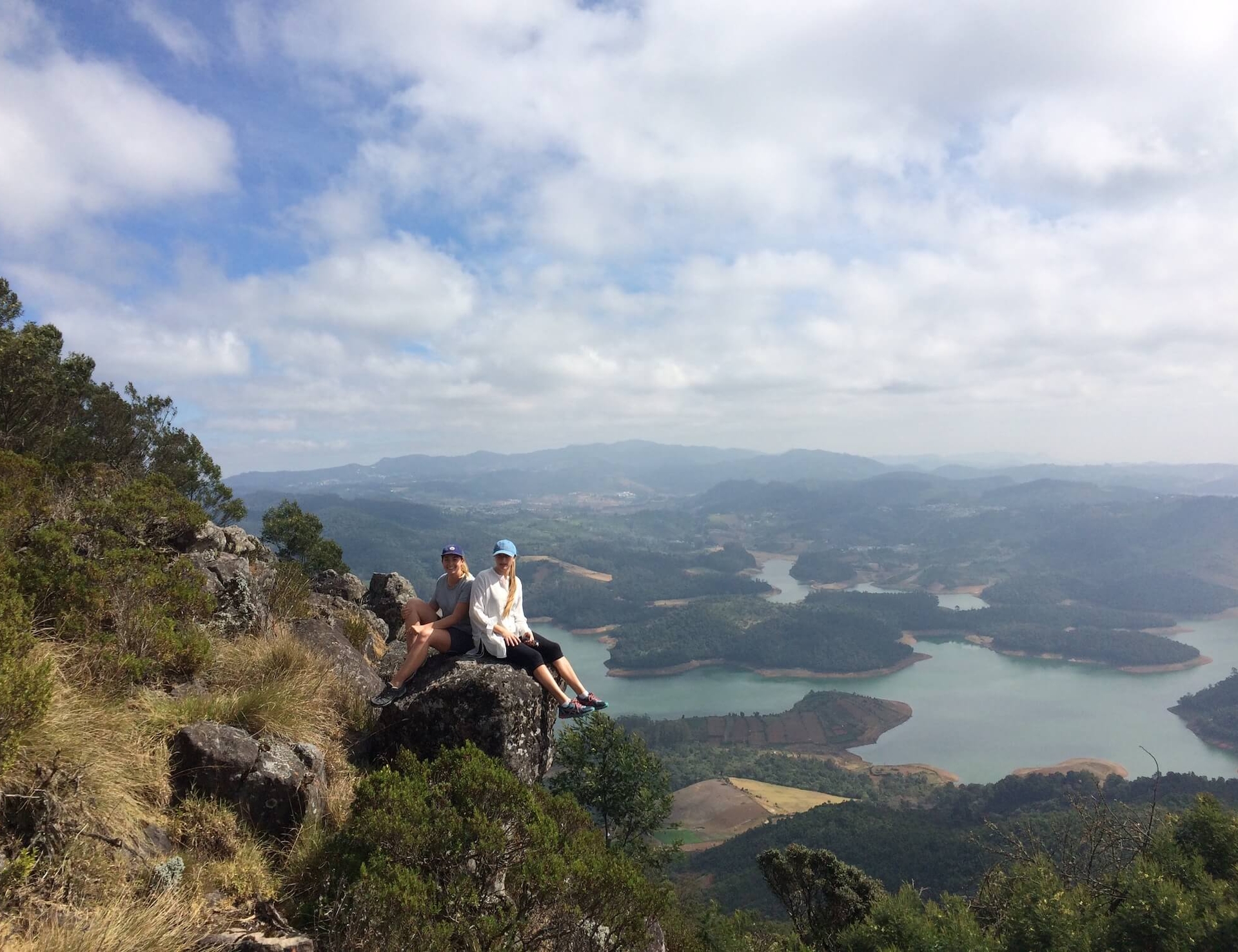14 days
From US $4,995
Coast to Coast Luxury Bike Tour
From coastal South to east of South India, starting from Kochi and ending in Chennai, this tour takes you through two contrasting; backwaters and hills of Kerala to the rural & coastal sides of Tamil Nadu.
This trip entails traveling back in time to 2500 years ago to the heart of the Dravidian civilization. Besides the easy-paced coastal cycling stretch, you can look forward to historical monuments and carved temples from the significant dynasties that ruled Southern India. Fresh seafood, scenic fishing villages, and a variety of social and topographical landscapes await you on this cycling tour. Enjoy India’s architectural grandeur at the rock-cut temples of Mahabalipuram, mammoth Gopurams of the Meenakshi temple, and the large complex of the Thanjavur temple. Besides the temple trail, enjoy the short rendezvous with the ex-French colony, Pondicherry, home to the international community village of Auroville. Along with a slice of culture and history, expect to cycle down pristine coastlines, forested mountains, and rural villages where children run to greet you with a big smile.
Kochi | 13:00hrs
Chennai
premiere
easy to moderate
55km or 33mi
10
Highlights
Itinerary
Brief Itinerary
| Day | Place | premiere Inns (subject to availability) | Meals | Distance | Activity |
|---|---|---|---|---|---|
| DAY 1 | Fort Kochi | Malabar House | D | ||
| DAY 2 | Kumarakom | Coconut Lagoon | B,L,D | 50km / 31mi | cycling |
| DAY 3 | Kumarakom | Coconut Lagoon | B,L,D | 30km/18mi | cycling |
| DAY 4 | Thekkady | Spice Village | B,L,D | 50km/31mi | cycling |
| DAY 5 | Thekkady | Spice Village | B | ||
| DAY 6 | Madurai | Heritage Madurai | B,L,D | 65km/40mi | cycling |
| DAY 7 | Chettinad | Chettinad Visalam Hotel | B,L,D | 60km / 37mi | cycling |
| DAY 8 | Chettinad | Chettinad Visalam Hotel | B,L,D | ||
| DAY 9 | Thanjavur | Svatma | B,L,D | 60km / 37mi | cycling |
| DAY 10 | Kumbakonam | Mantra Koodam | B,L,D | 70km / 43mi | cycling |
| DAY 11 | Pondicherry | Palais de Mahe | B,L,D | 70km / 43mi | cycling |
| DAY 12 | Pondicherry | Palais de Mahe | B | 30km / 18mi (optional) | cycling |
| DAY 13 | Mahabalipuram | Taj Fisherman’s Cove Resort & Spa | B,L | 70km / 43mi | cycling |
| DAY 14 | Chennai | B |
Detailed Itinerary
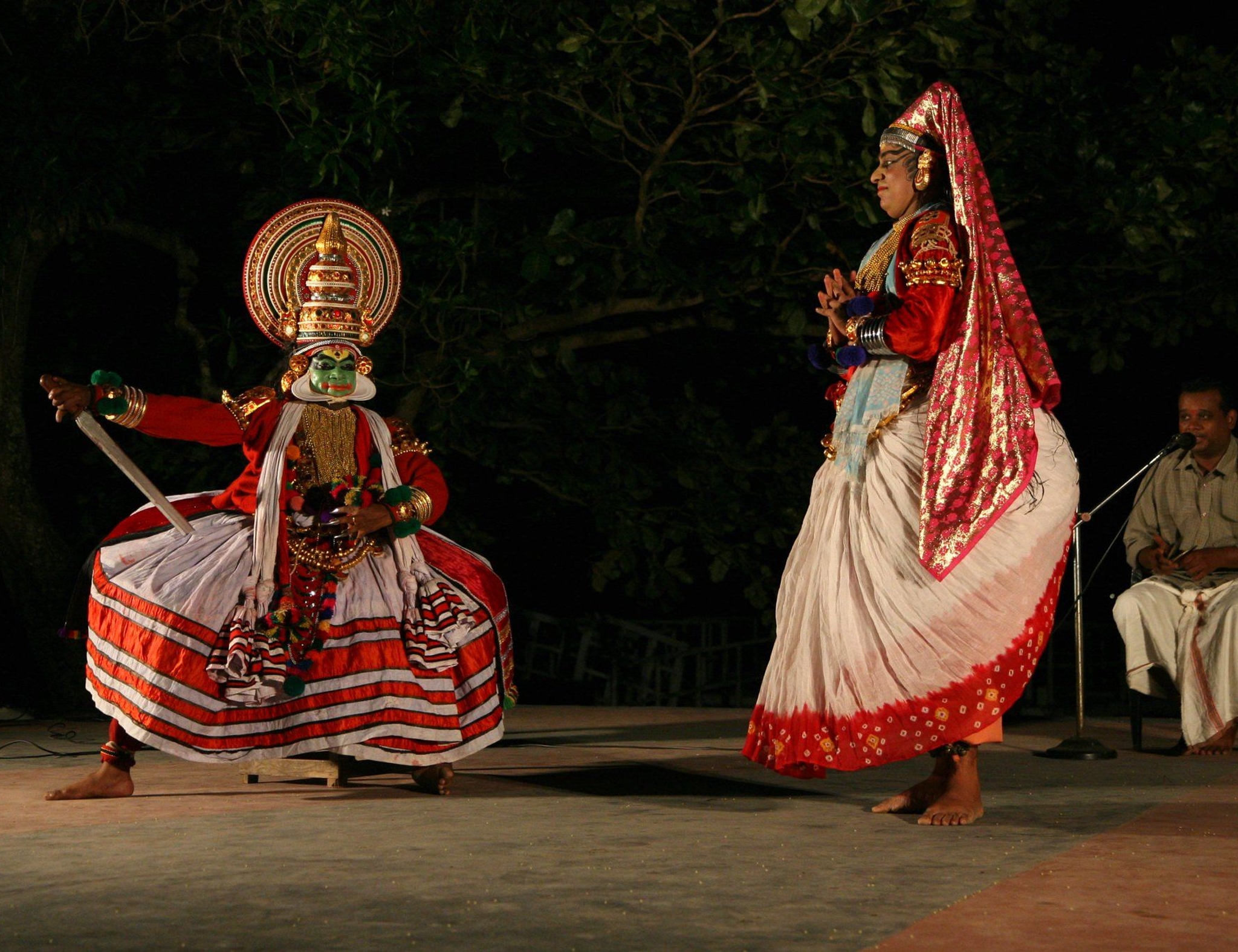
Day 1: Fort Kochi
Meet your trip leader at the hotel around 13:00hrs and head out to see Fort Kochi by bike.
One of the foremost trading hubs on the western coast of India, Fort Kochi drew colonial interest with its aromatic spices. Along with traders from China, Portugal, Arabs, and Holland came a cocktail of religions, cultural practices, and diverse food. Kerala owes its cosmopolitan vibe to the traders who braved the seas to come to this land.
Fort Kochi is dotted with remnants of the past, which you can discover on foot/bike. Step out to see the Vasco Church, Basilica, Dutch Cemetery, and the famous Chinese fishing nets, which lie within a 2km radius.
In the evening, we convene over dinner tonight at a seaside restaurant known for seafood and Indian delicacies.
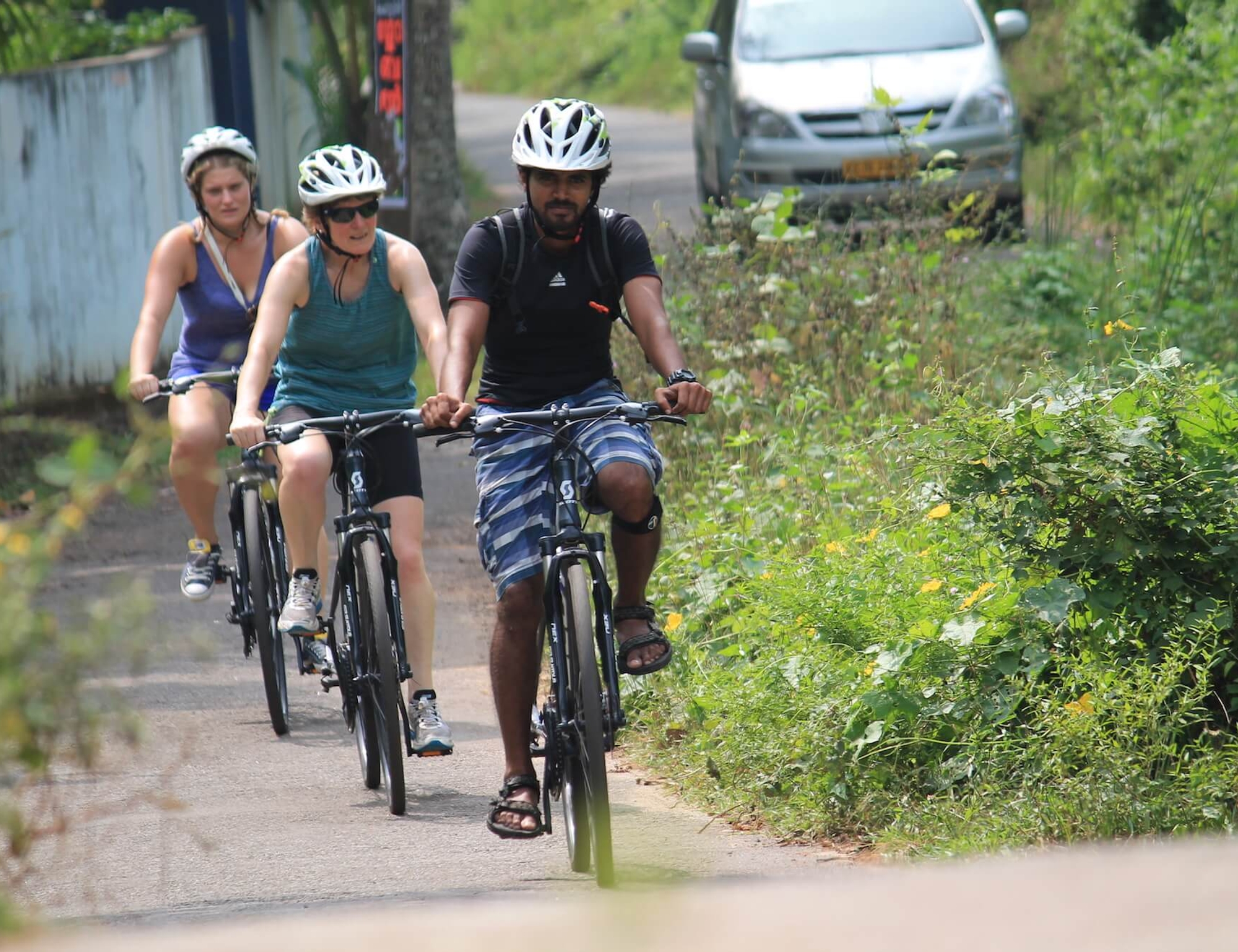
Day 2: Kumarakom
A classic coastal ride along a beautiful stretch of white sandy beach on one side and unevenly spread serene backwaters on the other. See the birdlife in action with egrets, cormorants, herons, kites, kingfishers, ducks, and many more. A short stop to see the art of making traditional boats, locally called “Kettuvallom”. They make wooden boats both for backwaters and the sea.
We may also see coconuts cut into halves and drying under the sun. The dried coconuts will be further pressed in the oil mills nearby to make the coconut oil. From curries to Ayurvedic oils, coconut and its oil is an essential part of daily life here.
Other common sights that you may see – people collecting clams by diving in and out of the backwaters, small village fish markets and auction centers, ladies walking door to door for the sale of fish, fisherman returning from sea, and Christian churches almost every few kilometers.
We keep biking through small fisherman's villages, lush coconut trees, and plenty of fish farms.
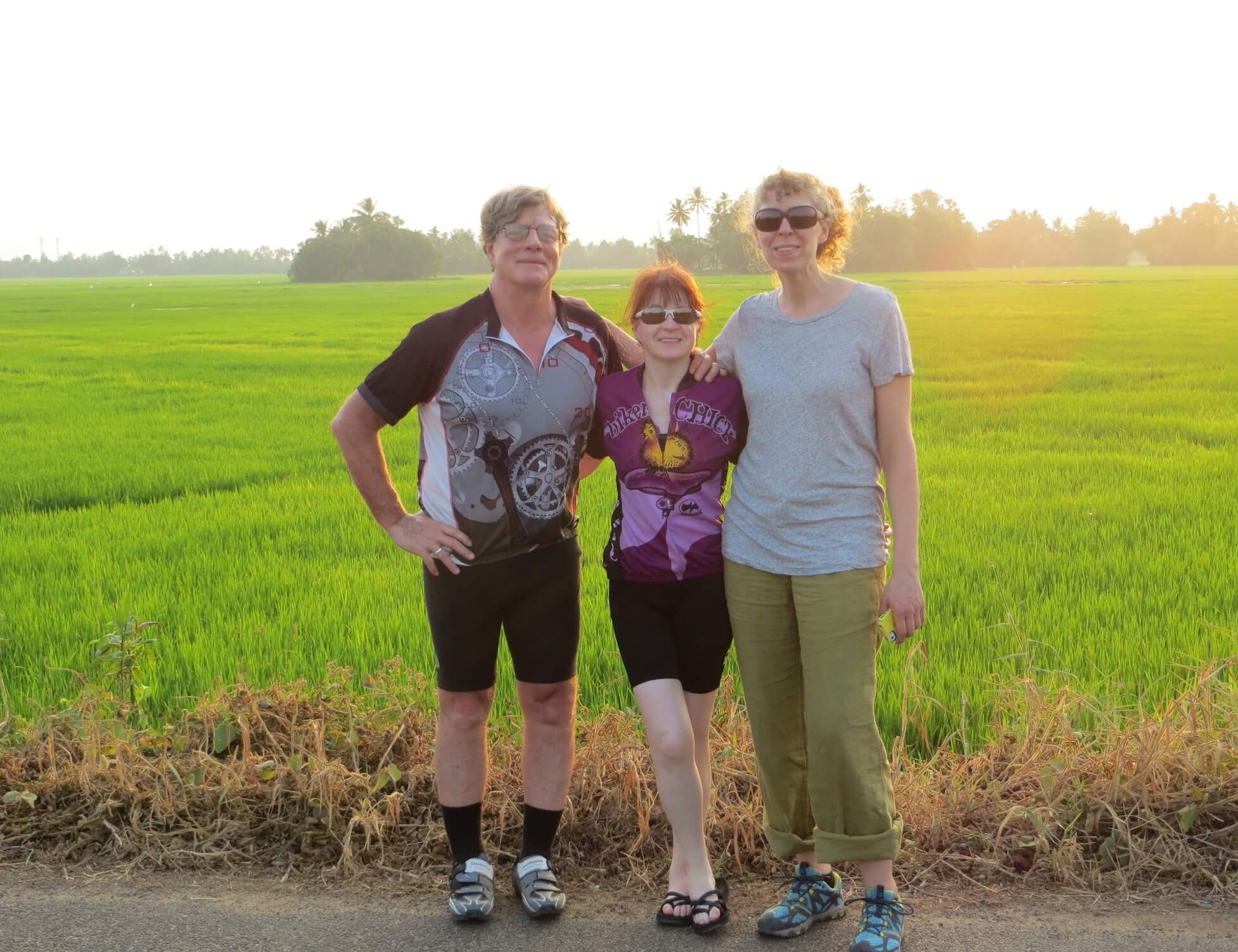
Day 3: Kumarakom
A beautiful ride today takes us near spectacular backwaters. Enjoy stunning vistas in all directions. Small canals, country canoes, fisherman throwing nets into the water, a coconut climber climbing up the coconut tree, and women working in the rice fields; all come into the scene one after the other.
Also, ride through the narrow lanes and experience a fabulous birdlife before looping back to Kumarakom, situated right at the edge of mesmerizing Vembanad Lake.
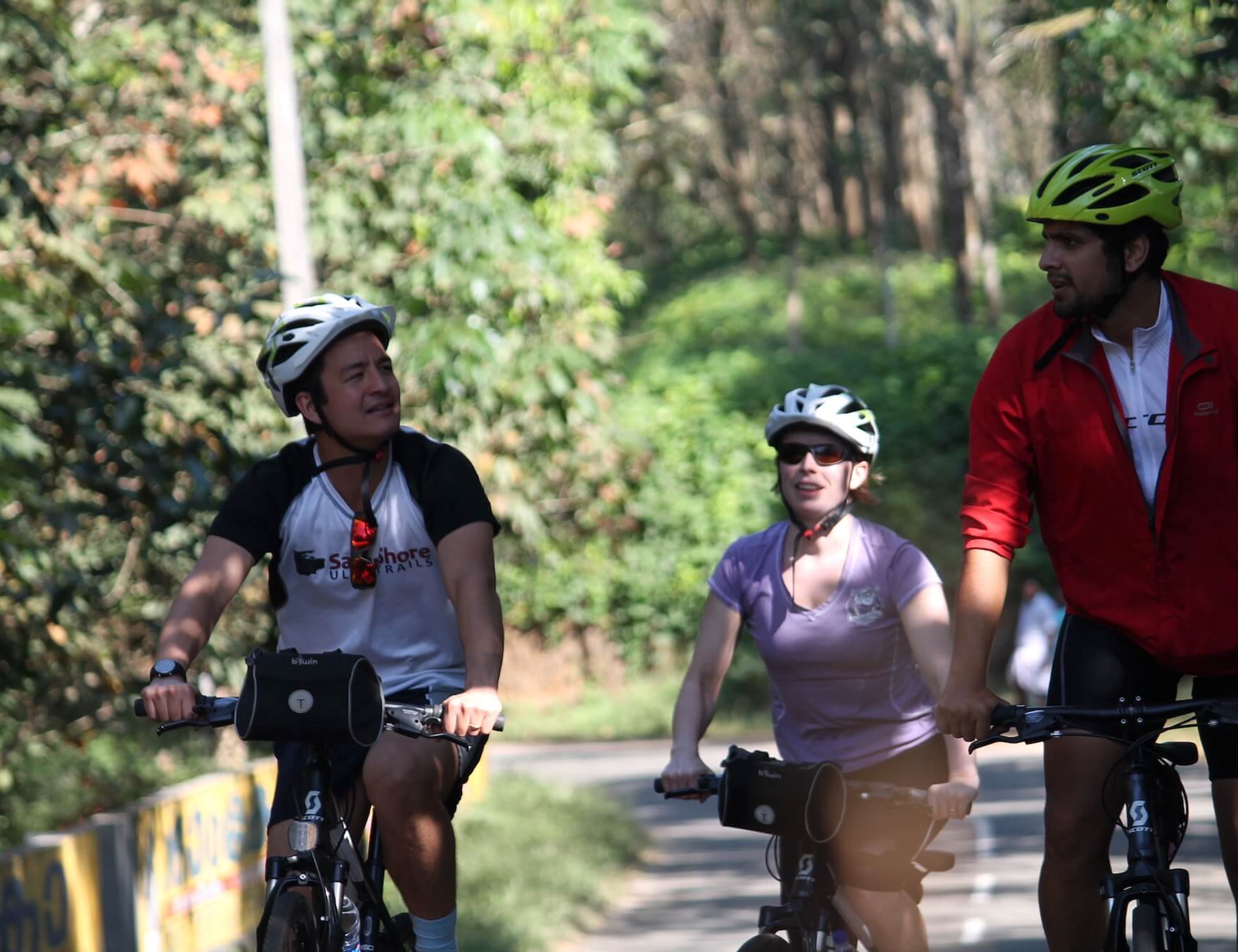
Day 4: Thekkady
From below sea level village in Kumarakom to the hill station of Vagamon, the lands transform from rice fields & lakes to rubber plantations & valleys. We take a shuttle to Vagamon and start cycling from here to Cardamom Hills of Thekkady, with few coffee plantations in between.
The birdlife is plenty with mynas, parakeets, and drongos making calls, and flying from one tree to another.
Thekkady and surroundings are known for forests and spice plantations. The queen of spices, “Cardamom”, is native to these hills of Thekkady.
This one is going to be a beautiful ride – from the backwaters to the midlands of Kerala and that too, through the rubber plantations.
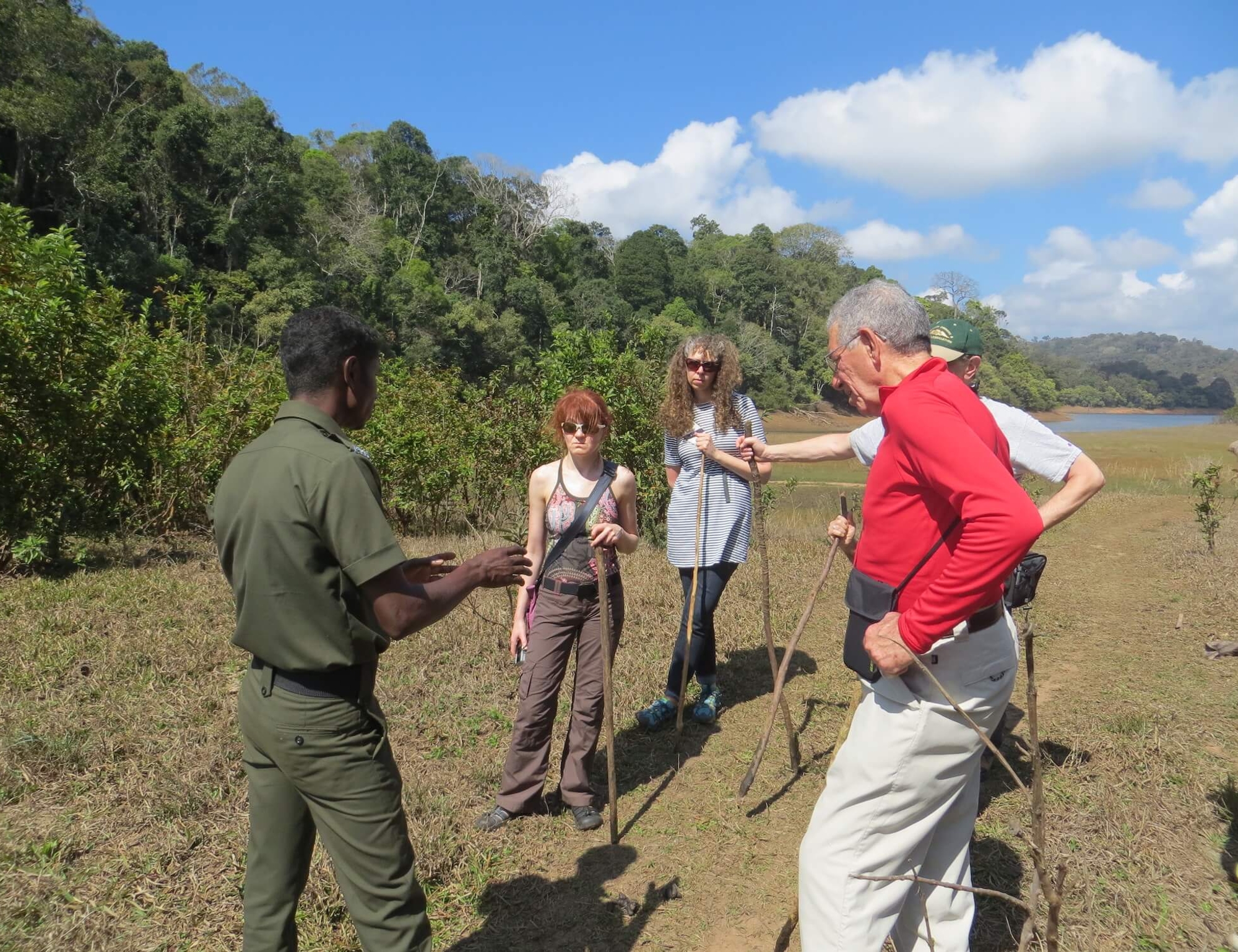
Day 5: Thekkady
You can explore the small town of Kumily at your own pace today. We recommend that you try and spend as much time at the Periyar National Park in Thekkady. One of the best managed in India, the national park is known for its innovative sightseeing options. Here you can do a short Nature Walk through Periyar National Park, which gives you a glimpse of the wildlife in the area.
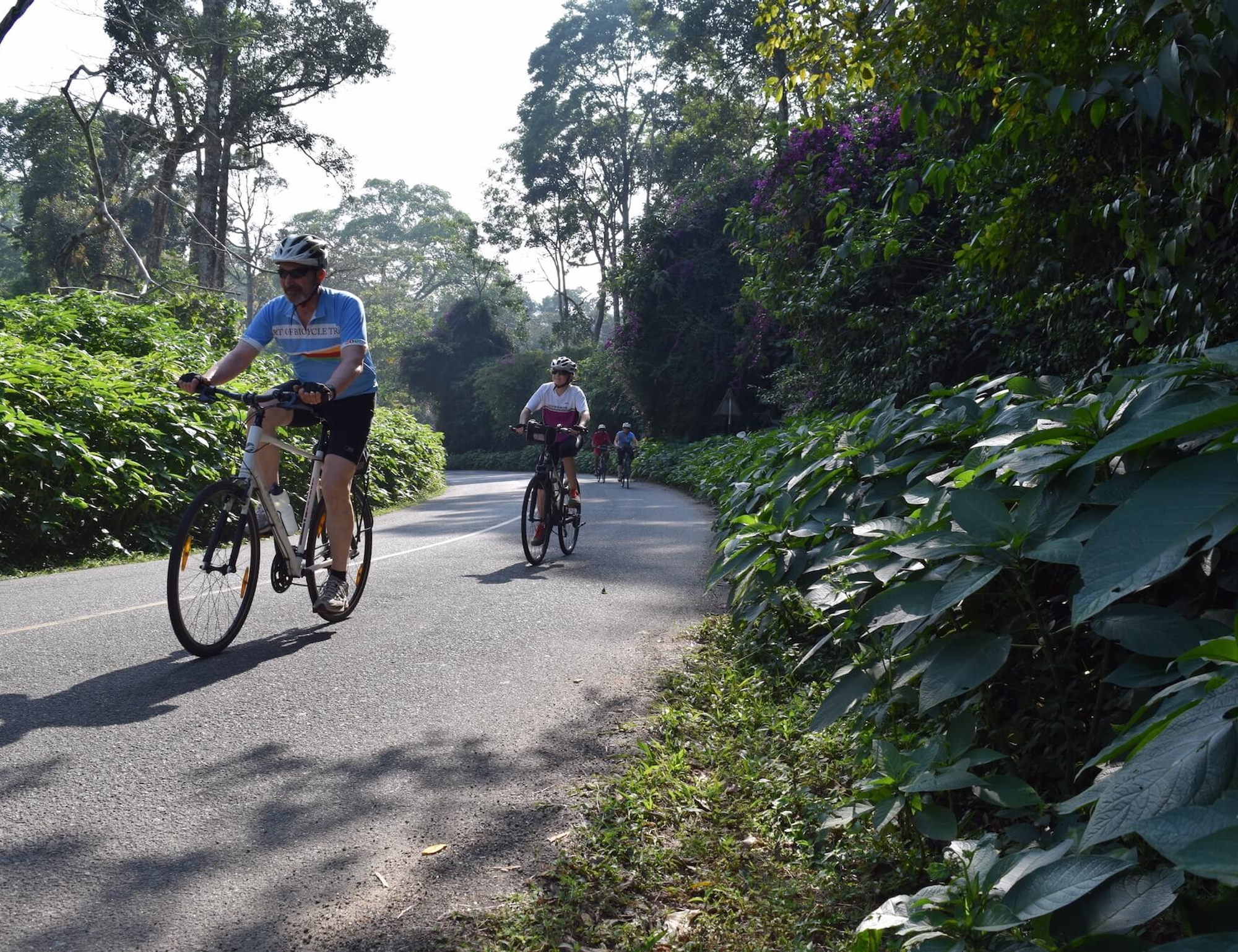
Day 6: Madurai
We take in the spectacular views of the western ghat mountains before descending to the neighboring state Tamil Nadu.
Cycling through many villages with banana plantations, vegetable farms, vineyards, and windmills, we reach the town of Theni. Post cycling, we have around 2 hours of vehicle transfer to Madurai.
Madurai one of South India’s oldest cities and has been a center of learning and pilgrimage for centuries. This is where Mahatma Gandhi took the decision, in 1921, to wear nothing but khadi (homespun cloth). Khadi textiles and tailors’ shops are everywhere in town.

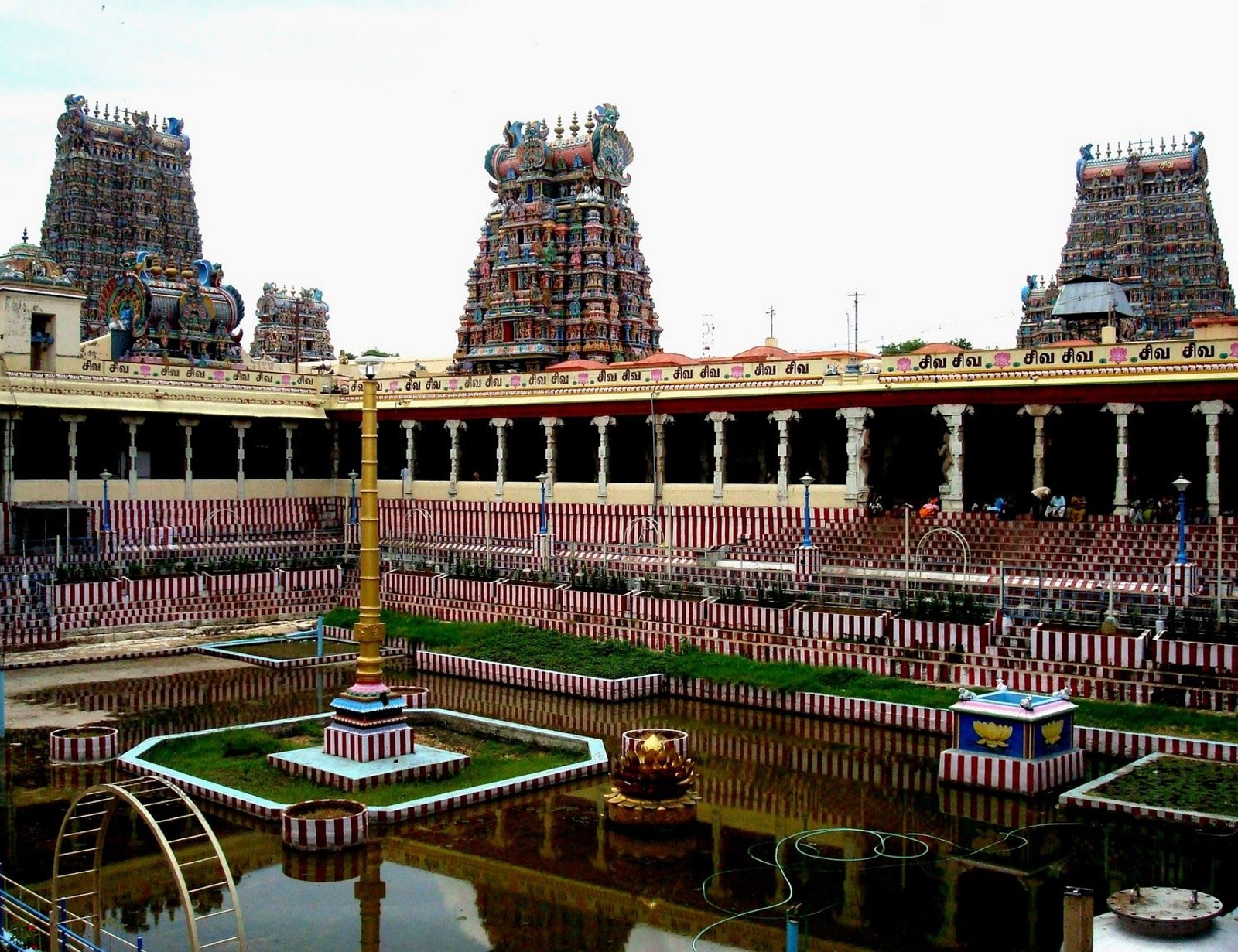
Day 7: Chettinad
It’s best to visit the main temple early in the morning when it’s relatively less busy. Meenakshi Amman (Sri Meenakshi) temple is dedicated to Lord Shiva and his consort, Goddess Parvati. The temple forms the heart and lifeline of the 2500-year-old city of Madurai. The temple complex houses 14 magnificent Gopurams or towers including two golden Gopurams for the main deities.
We ride to Chettinad, famous for its cuisine, architecture, and temples. Today look forward to your stay at Visalam, the palatial home of Kanadukathan village. Visalam is a heritage house of rare distinction. It is an endearing symbol of paternal love that equally captures the soul of Chettinad, a region renowned for its palatial homes, fiery cuisine and colourful culture.

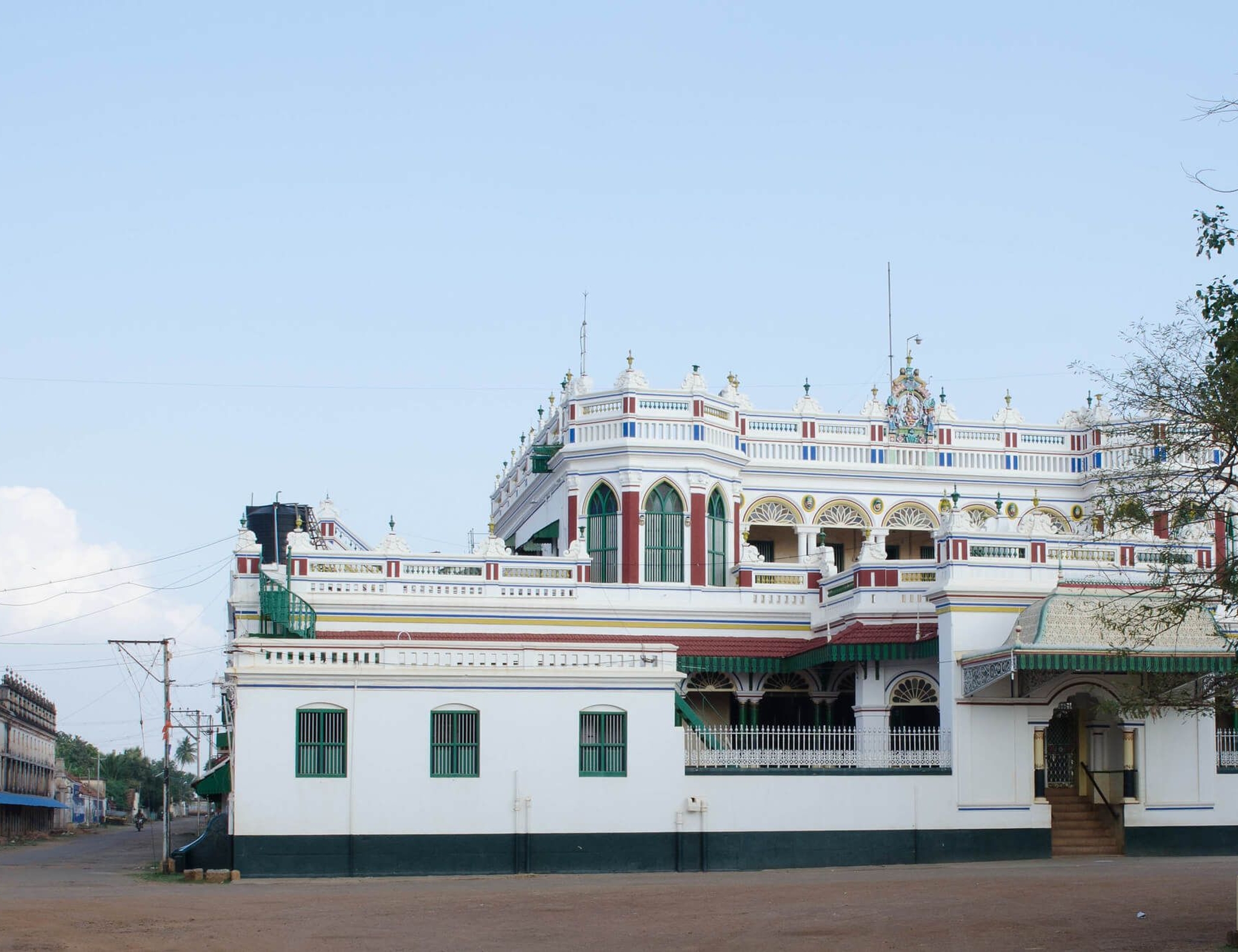
Day 8: Chettinad
Today the day is at leisure and you can plan your own day. Chettinad is the home to the Chettiars, a prosperous mercantile community. This place is well known for its fiery cuisine and architecture. Most of the palatial 18th century mansions that one will get to see here were built using materials imported from east Asian countries and Europe about 100 years ago.
The celebrated Chettinad cuisine is one of the spiciest and the most aromatic in India. The fresh ground masalas give it the distinctive integrity in taste. The cuisine that is pre dominantly non-vegetarian stretches out into interesting snacks and delectable vegetarian dishes too. At Visalam, one can learn to cook Chettinad cuisine with the Aachi(elderly lady) from the village.
Aathangudy, a village situated about 10 Kms from Visalam is a place famous for its hand made tiles. There are over one hundred small scale tile factories in this village where the entire tile making process is carried out by human hands.
The famed Chettinad's Cotton sarees and textiles are woven on in small handloom home units across Chettinad. A couple minutes walk away from Visalam is one such handloom unit making the most vibrant Indian textile.
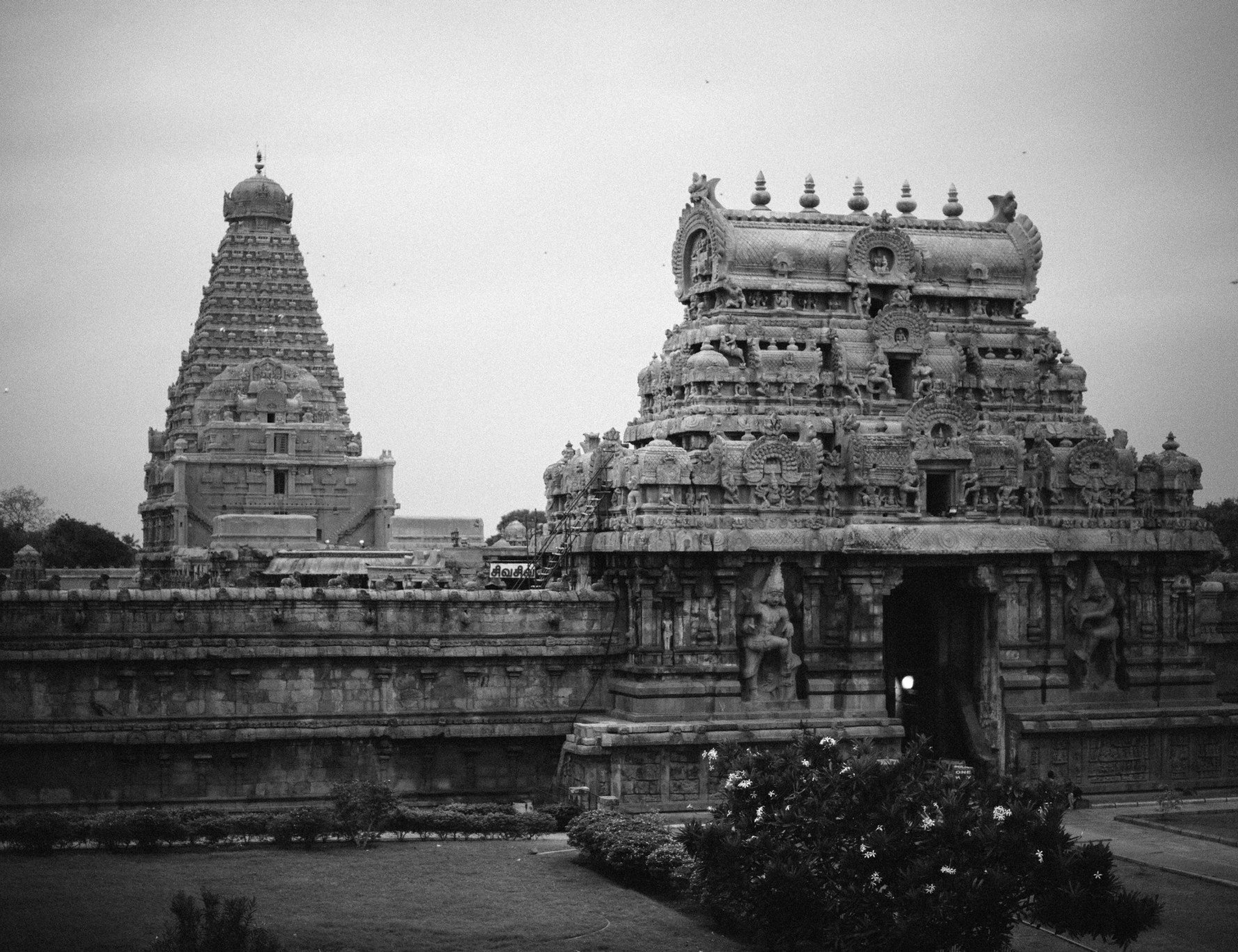
Day 9: Thanjavur
After breakfast, we ride into the adjoining temple village, Thanjavur. The World Heritage–listed Brihadishwara Temple is the main highlight here with its large Maratha Palace complex. Thanjavur is dotted with beautiful living temples in the entire region and we head out with a guide to see the important ones. The village is also known for its bronze paintings that can be bought as souvenirs.

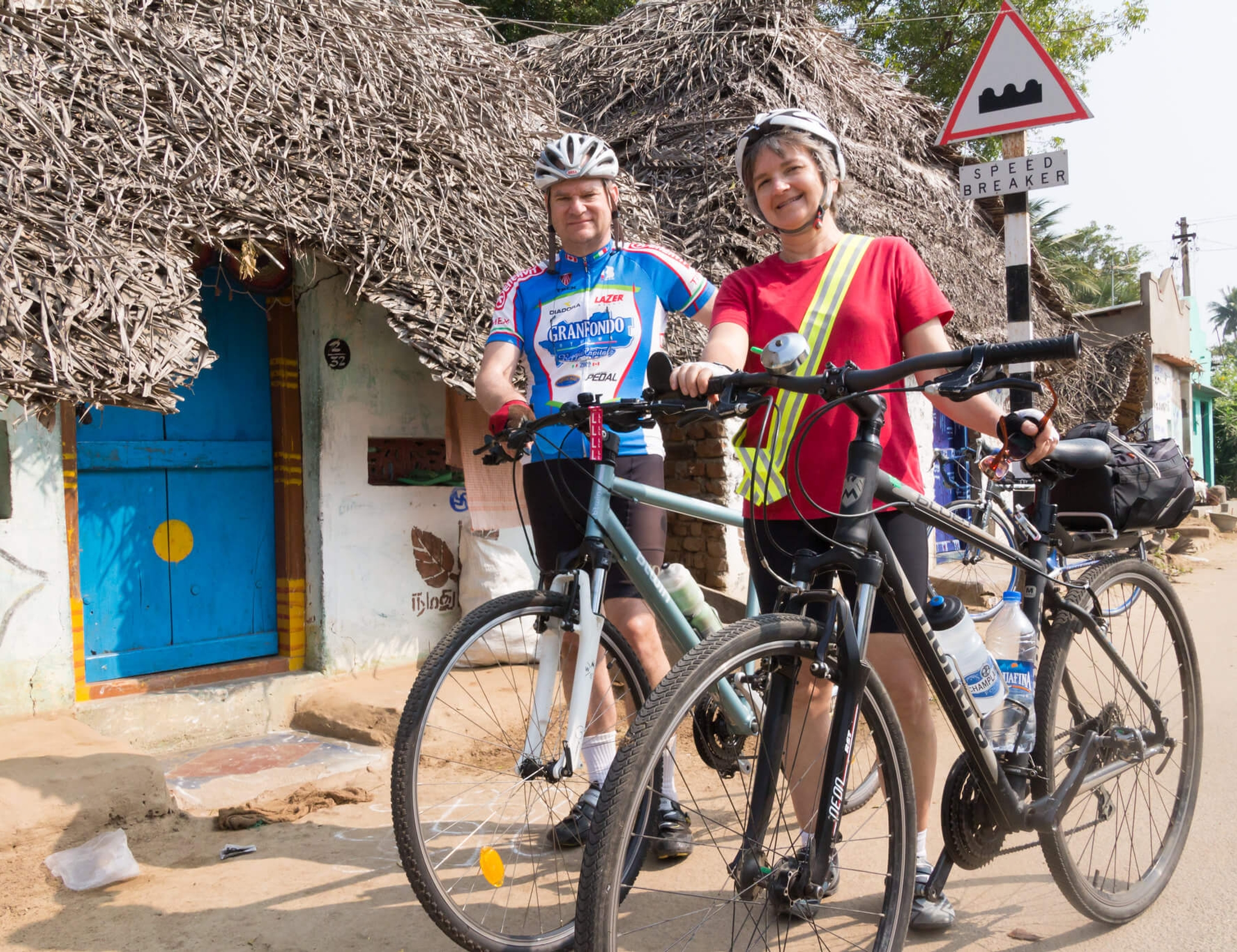
Day 10: Kumbakonam
Today is a classic ride where we pass through small villages and see plenty of rice fields on one side and the river Kaveri flowing on the other.
Kumbakonam dates back to a historically significant period and was ruled by many distinguished dynasties of India – the Early Cholas, Pallavas, Medieval Cholas, Later Cholas, Pandyas, the Vijayanagar Empire, Madurai Nayaks, Thanjavur Nayaks, and the Thanjavur Marathas. It rose to be a prominent city between the 7th and 9th centuries AD when it served as a capital of the Medieval Cholas. The town reached the zenith of its prosperity during the British Raj when it was a prominent centre of European education and Hindu culture; an apt moniker, “Cambridge of South India” was attributed to the city. Kumbakonam is known for its temples and religious groups, called ‘maths’. There are around 188 Hindu temples within the municipal limits of Kumbakonam. Apart from these, there are several thousand temples around the town thereby giving it another apt sobriquet, the ‘City of temples’.

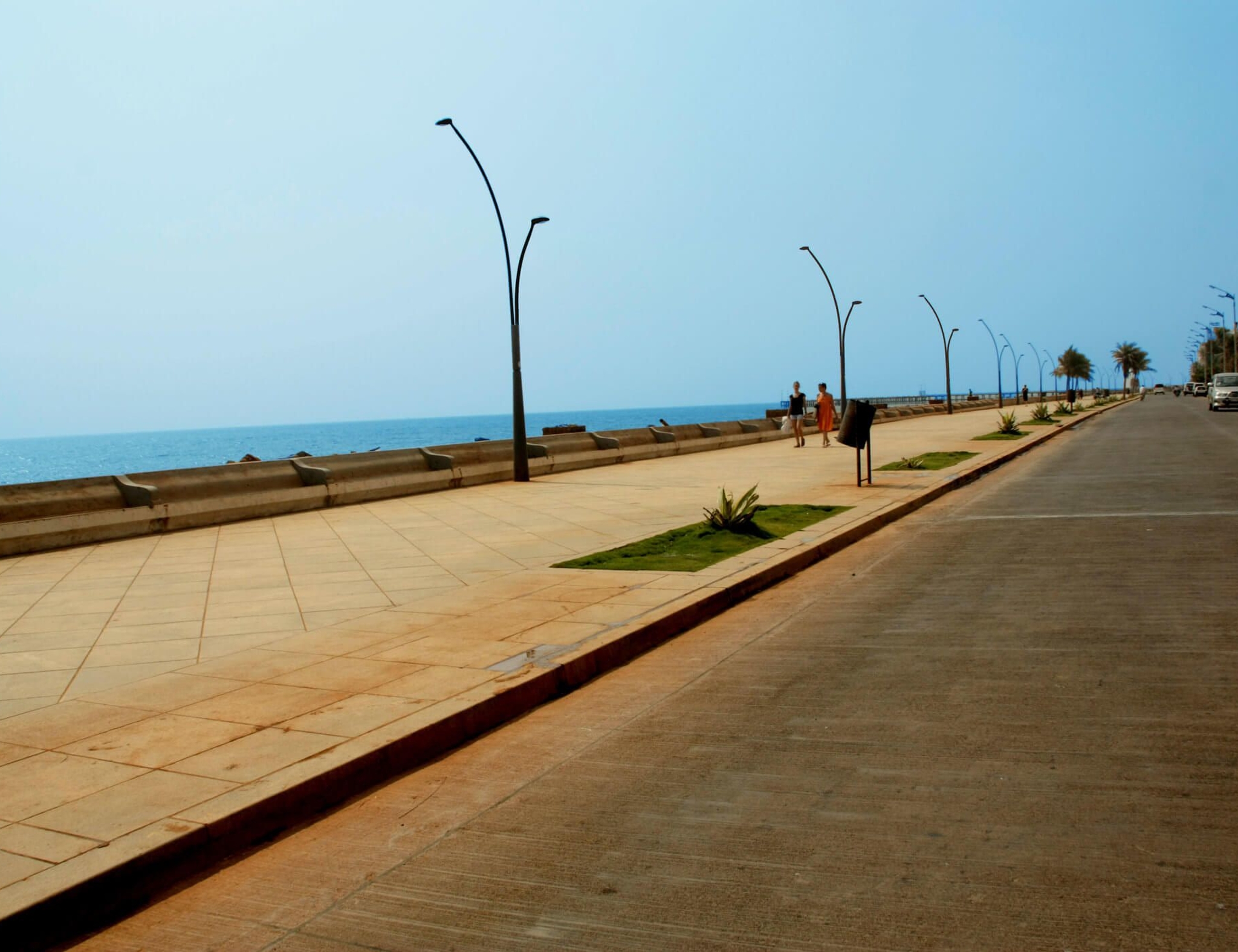
Day 11: Pondicherry
The ride to Pondicherry is slightly long but not difficult. It’s easy to pace up given that there are no major climbs. You will find fishing villages and salt plains, as you ride along the breezy sea. A former French colony, Pondicherry is a quaint seaside town with cobble-stoned boulevards, bright cafes, buildings remnant of French architecture, and the famous Aurobindo Ashram. The town was distinctly divided into the Black (local) and White (for Europeans) towns and has a vast amount of history and architectural interest.
Head out in the evening to explore the Pondicherry town. You can walk along the main Goubert Avenue where the whole town congregates in the evenings for walks as the breeze from the sea makes the weather ever pleasant.

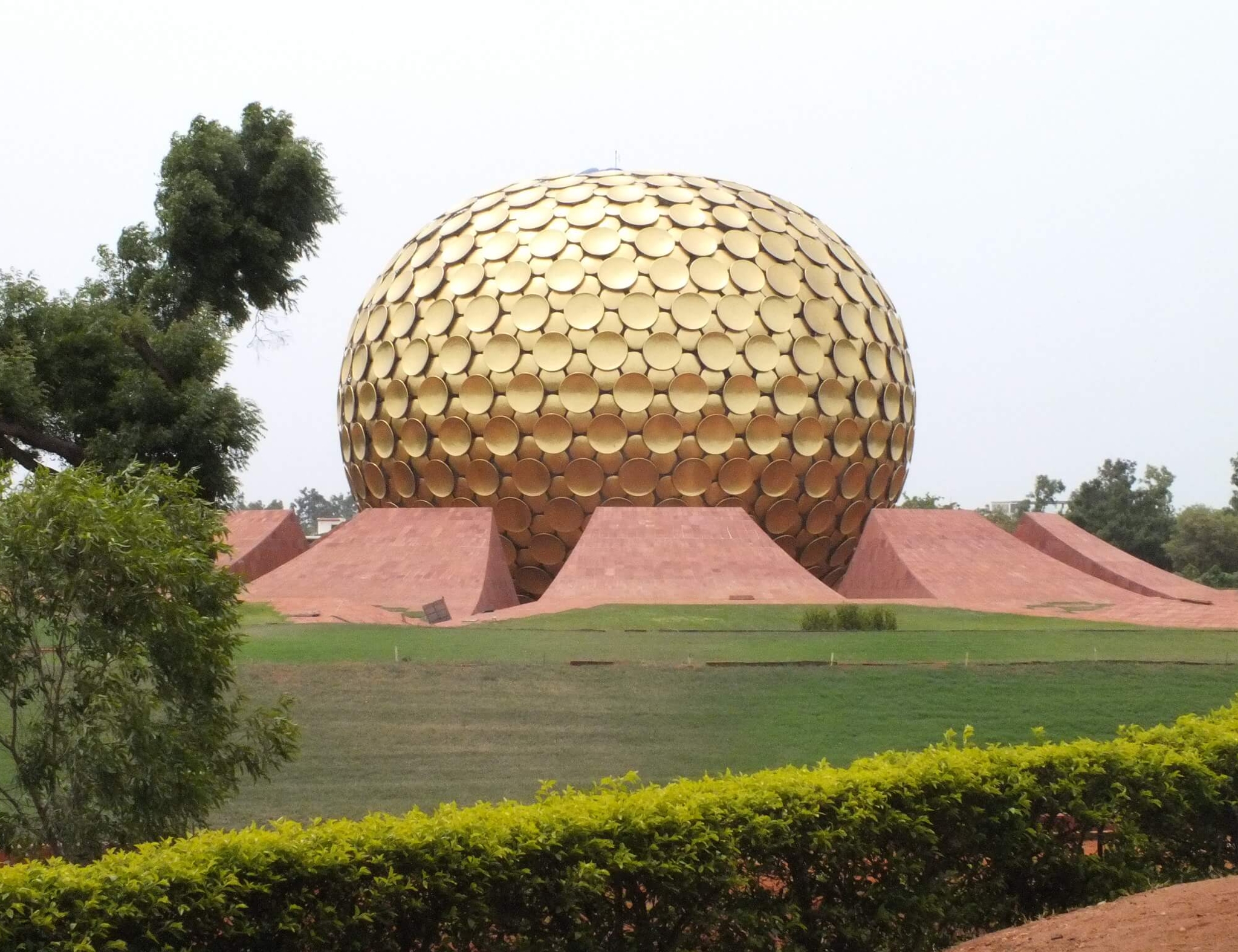
Day 12: Pondicherry
Today's ride is optional. You can plan your own day or ride with us to Auroville. A unique township, Auroville was constructed to include communities from all over the world, based on the vision of Sri Aurobindo and The Mother. It wants to be a universal town where men and women of all countries are able to live in peace and progressive harmony above all creeds, all politics, and all nationalities. It has ballooned to encompass more than 80 rural settlements spread over 20km and about 1800 residents. If you’re really interested in the philosophy it’s worth the ride out to the visitors center to find out how it all works and eat some great food at the café.
You can also try your hand at surfing in the mild waves of the Tamil Nadu coast or take a quick dip with scuba experts on this day.
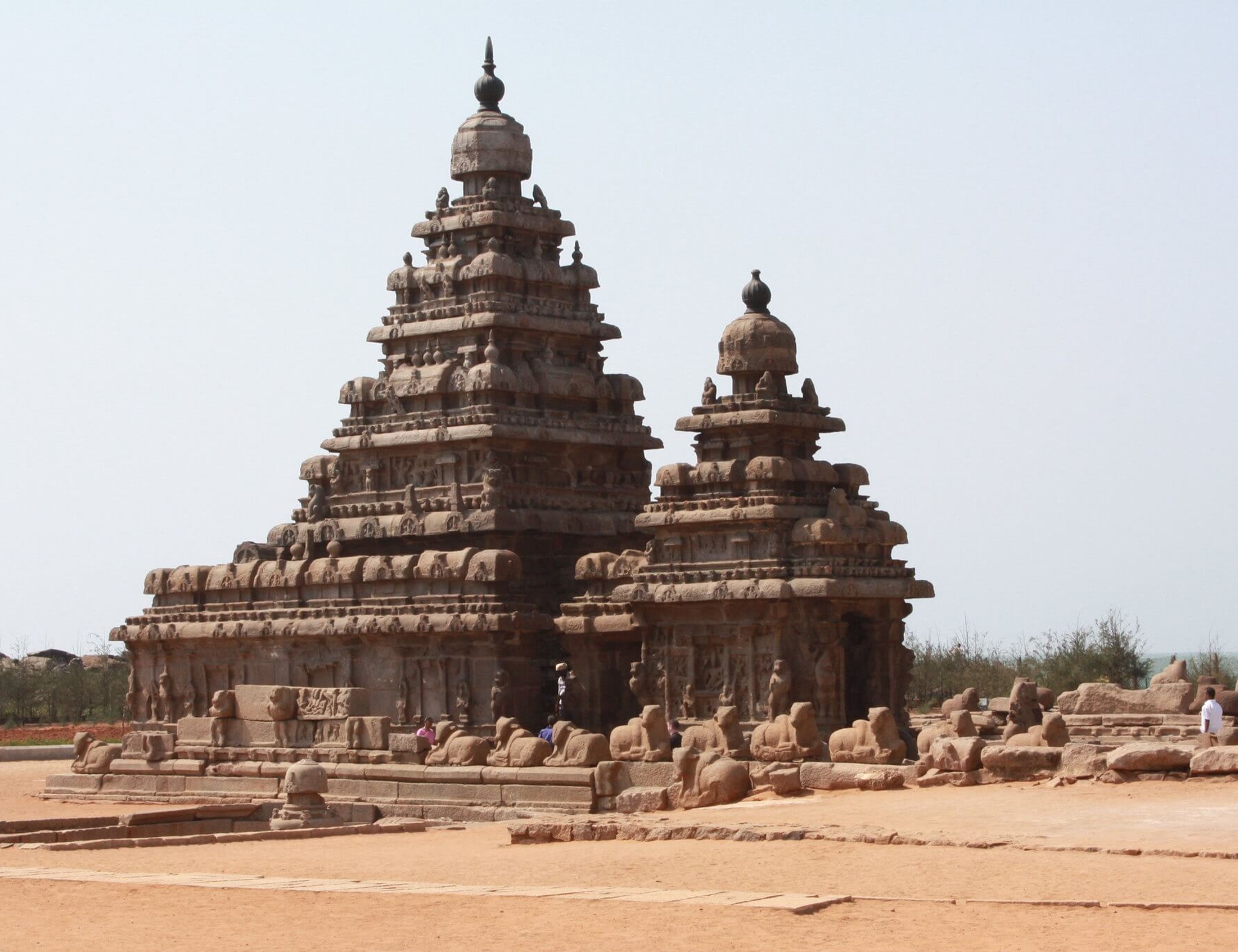
Day 13: Mahabalipuram
After breakfast, enjoy a gorgeous ride to Mahabalipuram through the coastal route; the East Canal Road (highway) stretches along the coast, and you can detour anytime into the untouched beaches for a quick dip. Cycling is easy as there are no ascents – you will only have to hydrate yourself a lot due to the clammy weather. Famous for its ancient rock carvings, especially the Shore Temple, Mahabalipuram was once the second capital and seaport of the Pallava kings of Kanchipuram. Mahabalipuram is listed as a UNESCO World Heritage site and has various historic monuments built largely between the 7th and the 9th centuries and remains a renowned center for stone carving. As you enter the village, you’ll see and hear the constant tapping of hammers and chisels as artisans chip away at exquisite sculptures.
Mahabalipuram is a small town, most of which you can cover on foot. It wakes up to the sound of sculptors’ chisels on granite, creating impressive sculptors, which make for great souvenirs. You can browse hassle-free and buy from the fixed-price Poompuhar Handicrafts Emporium or from the craft shops that line the main roads. Explore the lighthouse and take a guided trip to the temples of Mahabalipuram.

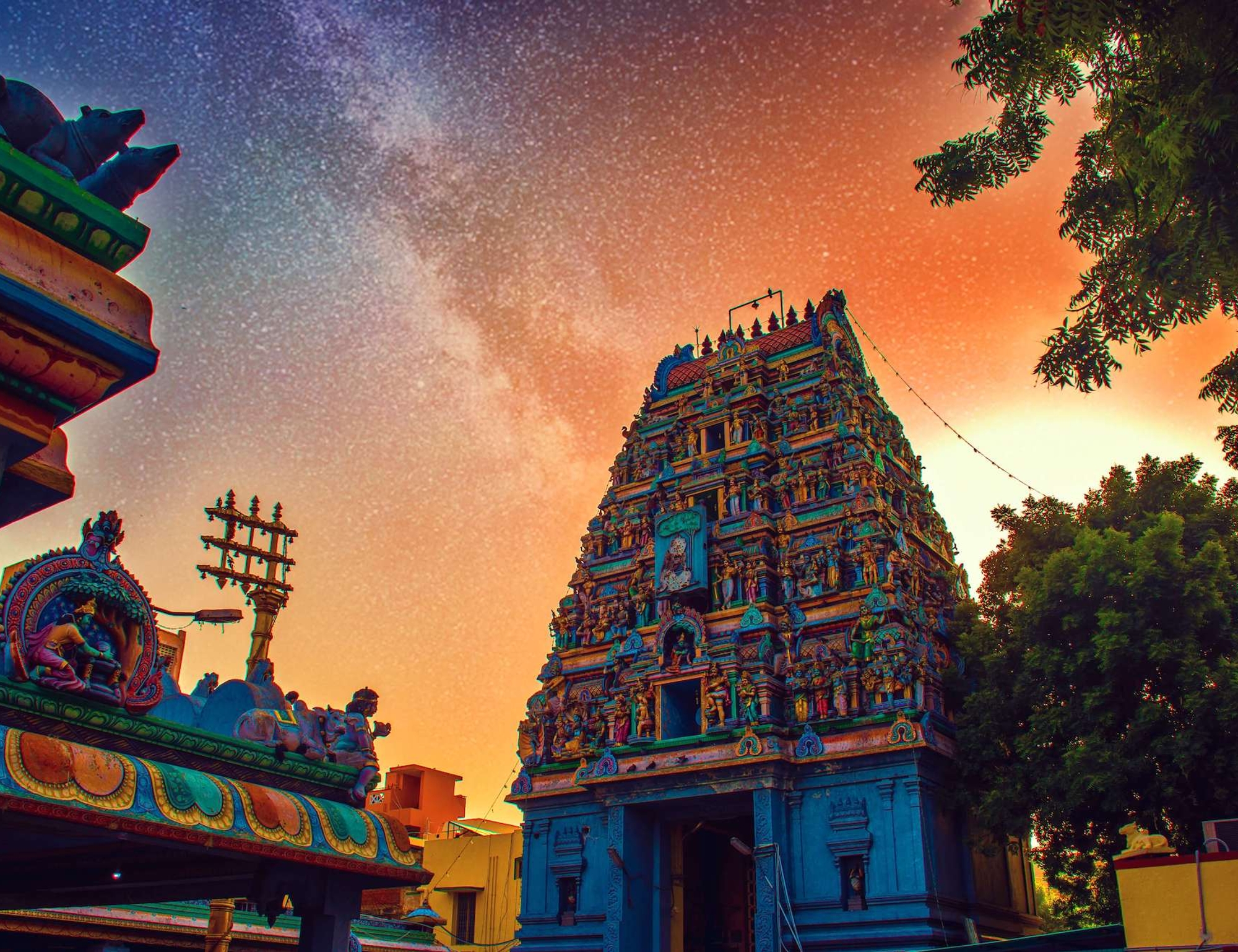
Day 14: Chennai
Today we transfer to Chennai. Explore a bit of Chennai if you have the time. The hot sultry seaside city represents a wonderful cusp of traditions and contemporary lifestyle. Visit the busy Mylapore temple area to see pilgrims buzzing in and out of the famous temple and the streets drenched in a splash of color.
We recommend extending at Taj Fisherman hotel, a beach resort that is built on the ramparts of an old Dutch Fort, and enjoy the beach for more days.
Ready to plan your adventure? Download a print-ready detailed itinerary.
Map
Accommodation
Each hotel has been thoughtfully selected to ensure an exceptional and memorable experience for guests. Should the listed hotel be unavailable, we will ensure an alternative of similar quality.
Dates and Prices
Couldn't find a trip with convenient dates?
Open your date as a join-in tour or customize further as a private one.
Essential Info
Inclusions
LODGING
All hotels as mentioned in the tour details or similar (subject to availability).
trip leader
Expert Trip Leader(s) who look after your every need and add meaning to your vacation.
bike
Immaculately maintained bike with helmet, suited to a terrain.
shuttle
A Van support follows the group of riders and carries all belongings.
meals
Meals as per itinerary. Guests are given the opportunity to dine on their own so that they discover a location independently.
refreshments
Refreshments and mineral water while cycling.
entrance
Entrance fees to most of the monuments and temples.
Exclusions
Airport pickup and drop
We recommend to book direclty from airport or hotel.
Beverages
Beverages such as alcohol, tea, coffee, juice at a hotel or restaurant.
Gratuity
Gratuities for your guide team are not included in the trip price.
Bikes
When you have a road and the thrill of a journey ahead of you, it’s imperative to have a good bike to enjoy it. Our fleet majorly consist of the below bikes as a part of this tour. However, sometimes due to height or availability constraints, we may provide a different but similar quality bike.
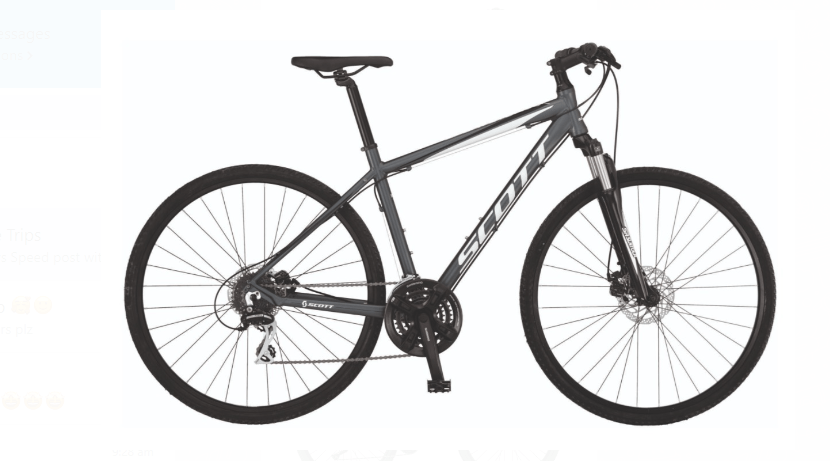
Scott Sportster or similar
Included in your trip price
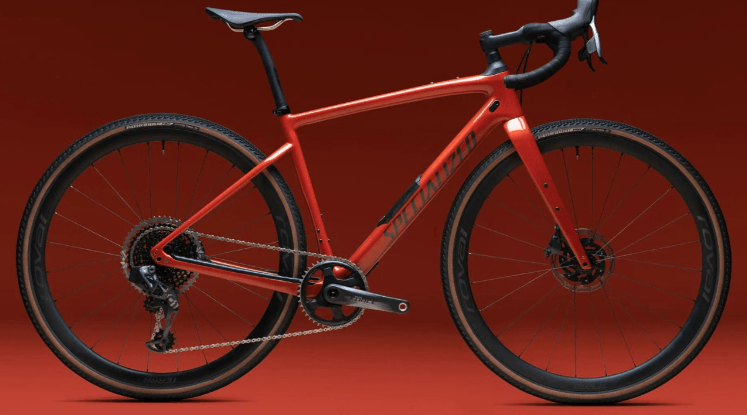
Specialized Diverge or similar
Available at a surcharge
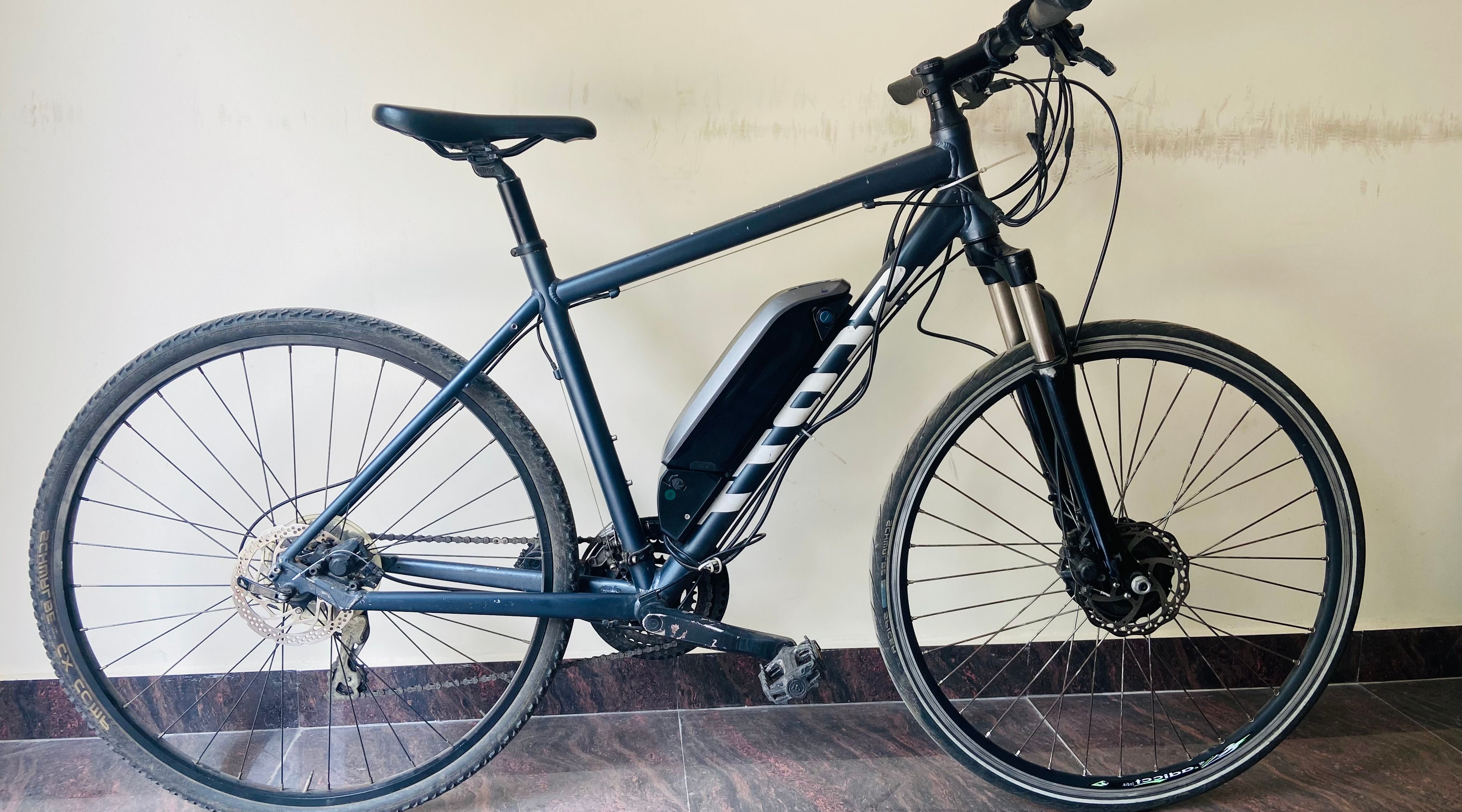
Scott E-Bike or similar
Available at a surcharge
Arrival & Departure Details
All major airports in India have prepaid taxi cab booths located inside the airport itself. These are typically situated just before the exit gate of the terminal. You can book a prepaid taxi cab from this booth.
Uber is also available in major Indian cities.
You can exchange local currency from the exchange situated within the airport, or from ATMs situated outside the airport.
Weather
With varied terrain, starting from below sea level in coastal plains to 1900m in the mountains, Kerala has a diverse climate. A typical tropical climate remains cooler in the highlands and hot and humid in the coastal plain throughout the year.
Mid-November to the end of February is the winter time in Kerala, which is best experienced in the highlands with a pleasant climate in the mornings and temperature falling below 10°C at the night. A fleece jacket or warm sweater and long pants may be needed for the cooler evenings and mornings in hill stations. The temperature in plains averages between 25°C to 31°C during this time.
From the beginning of March till the end of May, it is summer. The temperatures go above 40°C during some days in coastal pains and generally remain very hot and humid. The highlands still offer some relief during this time with comparatively cooler climates.
The start of June is the beginning of the Monsoon season in Kerala. Kerala receives two cycles of Monsoon. From June till September, it’s the southwest monsoon, which brings heavy rainfalls till mid of August and it slowly weakens towards the end of September. The second cycle, the Northeast monsoon, starts from the beginning of October till mid-November with light to heavy showers mainly during the evening hours.
What to Pack
Packing smart is essential for a safe and enjoyable cycling adventure. From essential biking gear to clothing and travel necessities, this guide ensures you're prepared for any terrain or climate.
Recommended Bicycling Clothes & Gear
- Bicycling shoes or stiff-soled sneakers.
- Padded cycling shorts.
- Short-fingered cycling gloves (personal gloves are ideal).
- Brightly colored cycling jerseys or synthetic T-shirts for visibility.
- Synthetic cycling socks.
- Sunglasses with UV protection.
- Personal helmet (recommended even though provided).
- Personal saddle (optional for added comfort).
- Rain jacket or windbreaker.
- Cycling water bottle (to reduce plastic waste).
Note: Helmets, gloves, and water bottles are personal items, so bringing your own is recommended for maximum comfort and hygiene.
Clothing
- Light, breathable fabrics like cotton or linen.
- Full-sleeved clothing for sun protection.
- Warm layers for chilly mornings and evenings (if traveling in winter).
- Comfortable footwear for non-cycling time.
- Bring a compact rain jacket in case of sudden weather changes.
- Ethnic or modest clothing for exploring towns and temples.
Other Necessities
- Toiletries: Basic hygiene essentials, including insect/mosquito repellent and sunscreen.
- Hand sanitizer and wet wipes.
- Plug socket adaptor.
- Binoculars for wildlife spotting or desert landscapes.
Pro Tips
- Pack light but plan for the varying temperatures: warm days, chilly evenings, and desert winds.
- Use brightly colored clothing for visibility on roads.
- Pack light to leave room for shopping.
Luggage
Please limit your luggage to one medium-sized suitcase and one carry-on bag. Mark your luggage with your name, address, and phone number.
Visa Information
Before venturing on your adventure, make sure you're equipped with essential travel advice, including security updates, local laws, and crucial passport and visa information. Start by visiting the official government website of your home country for accurate and reliable guidance:
- UK Residents: Stay informed by reviewing the Foreign, Commonwealth & Development Office (FCDO) Travel Advice.
- US Residents: Access vital travel tips and updates through the US Department of State Travel Advice.
- Australian Residents: Plan ahead with the latest updates on the Smart Traveller website.
- Canadian Residents: Find comprehensive travel and visa guidance on the Government of Canada's Travel Advice and Advisories.
- New Zealand Residents: Get practical travel advice on the New Zealand SafeTravel website
- Residents of Other Countries: Check with your government or local consulate for tailored travel advice and requirements.
Note: Passport and visa regulations can change at any time. Stay proactive by checking for the latest updates to ensure a smooth and stress-free journey.
Insurance
Medical insurance that covers medical costs in case of an accident during the trip is mandatory to participate in our tours.
We recommend to purchase adequate travel insurance in order to participate in our tours and protect yourself from unforeseen events. Our experience shows that guests who purchase travel insurance—including coverage for all activities on the itinerary, trip cancellation, interruption, delay, baggage damage, loss or theft, personal accident, death and repatriation costs, medical and emergency expenses (including Covid-19), and personal liability—travel with greater peace of mind.
Can I use my credit card insurance?
Yes, as long as it meets our requirements and provides adequate coverage. Ensure you have an emergency contact number and policy number available.
When should I buy travel insurance?
Purchase travel insurance as soon as you've paid in full or booked your flights.
Is proof of travel insurance required?
Yes. You must provide your insurer's name, policy number, and emergency contact via our reservation form. This is mandatory. If you cannot provide proof, you’ll need to purchase insurance before traveling with us.
Does Art of Bicycle Trips sell travel insurance?
We do not sell travel insurance directly, as we believe our customers should have the freedom to choose a policy that best suits their needs. However, we recommend Insured Nomads as a great starting point.
Frequently Asked Questions
The fitness level required for each trip is indicated by the "level" of the tour, which in turn is mentioned on each tour page right next to the price and the trip duration.
Easy: The terrain is mostly flat with a few gentle climbs.
Moderate: The terrain is either mostly flat or consists of rolling hills with a few challenging climbs. There could also be a few days with longer riding distances of up to 75 kms (45 miles)
Difficult: The terrain is mostly hilly with strong elevation gains and/or has long days on the bike. Such trips are recommended for intermediate to advanced cyclists.
Please note that we usually bike around 4-5 hours per day irrespective of the level of the trip.
Yes, your trip leader will carry bottled water or RO water in a camper in the support van for guests' use.
Here are a few tips to avoid getting Delhi Belly while doing this bike tour:
- Always wash your hands before eating anything, even light snacks.
- Do not drink tap water. Drink only bottled water provided by your trip leader or by the hotel/restaurant you're staying or eating in. When buying bottled water from outside, check for seal and the brand. Avoid using ice, since ice is often made from tap water. Soda water, however, is usually safe.
- Avoid eating salads and cut fruits. Peeled fruits such as bananas and oranges are fine.
- Cooked food that is freshly prepared is usually safe to eat. Restaurants and eating joints that are busy are usually safer as the food is fresh and they rarely have anything refrigerated overnight.
Yes, please communicate your dietary preferences to your trip leader and they'll ensure that the food you eat is spiced as per your requirements.
The road surface is mostly good. 90% of the cycling on this bike tour happens on paved roads.
We've designed this itinerary such that most of the cycling happens on quieter countryside roads far from busy traffic. The shuttle transfers on this tour have been strategically planned to bypass busy vehicular traffic.
We are not medical advisors, and as such are not qualified to dispense medical advice. However, we recommend consulting the resources below for advice on vaccines and medications:
- CDC portal for travelers from the US
- NHS' Fit For Travel portal for travelers from the UK
- Smart Traveller portal or travelers from Australia.
In addition to the above, you may also refer to the travel advice issued from time to time by your government.
We generally avoid regions which are prone to outbreaks of malaria and dengue. However, as a preventive measure, you may carry mosquito repellant, and wear full-body clothing.
Consult your medical advisor for any pre-emptive medications or vaccines for the above.
While your tour price covers most common expenses, a few meals are not included in the itinerary. This allows you the opportunity to dine independently and explore the local cuisine at your own pace. Your guides will be happy to provide recommendations if desired. As a general guideline, you can budget approximately US $100–200 per person for additional expenditures over the course of the trip.
Tips are not included in your tour price.
As a general rule, you may tip US$ 15-25 per person per day.
This figure is for the entire crew including the trip leader, the driver, and other support staff.
However, you are not obligated to tip, and you can always tip less or more than the above amount depending on the level of service you received on tour.
It is usually the norm to tip the tour guide, who then distributes the amount among the entire crew. However, you can also tip each individual member of the crew if you so desire.
In case you want to tip the staff at a hotel such as porters, you may pay them US $2-3 per day.
You can exchange currency at the airport itself, or at ATMs in larger cities. Most commercial establishments will accept international credit cards for payments, though its good to carry some local currency with you at all times.
Yes, you may wear riding shorts while riding your bike. When not cycling, it would be advisable to wear comfortable full-length pants. We recommend keeping a pair of comfortable pants handy in you support van.
When visiting temples and monuments, visitors should wear full-length, loose-fitting pants. Holy places of certain religions may also require covering your head. Your guide will inform of the dress etiquette required for visiting specific religious places.
The meeting time on Day 1 is mentioned in your travel planner shared with you. You can arrive either on the morning of Day 1 depending on the meeting time, or book a pre-tour night to arrive a day earlier.
We don't have anything planned for the last day, so you are free to depart at your discretion.
For answers to broader questions, please visit our Comprehensive FAQs section.

